#so! give me feedback please! this is also dependent on how many portraits you want to do
Explore tagged Tumblr posts
Text
hey guys quick question regarding the keeper sexyman tournament coming up in february. would people interested in drawing portraits rather start them december or january
#the actual poll starts feb 11 like last year#so early january would give you a little over a month#but a lot of people also have christmas break in december. which could help timewise.#and. it is a bit more time to complete it.#so i was thinking maybe mid december?#but i also dont want anyone to think they have all the time in the world and then forget#so! give me feedback please! this is also dependent on how many portraits you want to do#some people only do 1 and some go for 3-5 so.#kotlc
17 notes
·
View notes
Text
2020 October Update
So... we've launched. And our launch was... actually kind of... bad...
This is a dev blog, so I'll speak on it. But before that, we do have the game's steam page up. If you're anticipating the PC release, please do visit the steam page and add it to your wish list. It would help us a lot.
VISIT STEAM LINK
...
So what didn't go so well?
1. We launched in Nintendo's Americas and Europe territory. If you've been following the release, you'd know that America got the game first. We didn't move to launch in Europe at all since I thought the EFIGS languages (English, French, Italian, German, Spanish) were pre-requisites for Europe. By the time I learned that this wasn't necessarily the case, and attempted to course correct, the damage was done. We had half the allotment of keys to do outreach, and maybe some European outlets that would've covered us, did not.
2. When the game launched, rather than a victory lap, what we experienced was more of a public lashing. We did get some reviews that praised the game highly, but just as many reviews lampooned the game for its high difficulty or other failings. I've since released two patches (or 3, depending on how you count it) to address the difficulty. A lot of overnighters. If you recall in the last blog post, I thought it'd be a good start if we got 20 or so reviews on Open Critic. But we've only 8 as of this writing, and the aggregate score isn't so hot. So that's a fail by my metric.
3. A publisher reached out to us because they were interested in physically printing the game! Yay! But... to advance our talks, they wanted to see the game's sales numbers to ensure that there's a good chance their investment could be recouped. And unfortunately, the game's sales numbers are pretty low. They backed out :(
Some hard lessons were learned. The biggest lesson for me concerns how well we playtested the game. Looking at the original playtester list, it's a short list. You may recall from a previous blog post that our ability to test was severely hampered by technical limitations. Add to that, a lot of people on this list are objectively really achieved players. We're talking power ranked in Smash Bros, regular tournament goers, and people who've played and bested every Souls game. And as the maker of the game, I am most blind to the game's challenges.
Now, I'm definitely more of the opinion that you prioritize PC development first. I still have some reservations about some stages of PC development. But if you do PC/Steam first, you have the great benefit of being able to do Early Access, which gives you access to a greater testing pool. I now view it as an invaluable part of the equation. If we had been able to do Early Access for 1 or 2 months before release, we probably could have ironed out most of the game's difficulty and balance problems. Hard lessons, indeed.
There were a lot of other notable events that occurred over the past 2 months - the travails of press outreach, realizing my own limits as a developer, feeling defeated and getting back up again, etc. There's too much stuff to chronicle or go into detail. But it wasn't all bad.
Some good things did happen...
We got a publisher to publish for Japan! It came as a huge relief, because clearly, we don't know what the heck we're doing.
The publisher has been an invaluable source of information and feedback. They've recommended some changes to the game to improve user experience. Some of these changes I was hesitant to do at first because they concerned systems I thought integral to the identity of the game. But after trying it, I have to admit, they're good changes.
So a Japanese version of the game was moving ahead. And it looked like that'd be it. I wasn't planning to move forward with any other language translations due to the game's low sales and our funds being depleted.
But, I was approached by a translator who urged me to move ahead with translations. He told me he was willing to work for only a small price initially and then be paid the rest after from a percentage of the game's sales until the cost of the translation was paid in full.
I was surprised translators were willing to work under such a model since it's entirely likely the game's current low sales trajectory would continue and they wouldn't earn back the full cost of translation. But I was also flattered they were willing to take a risk with me. After that, I approached some others with the same hypothetical deal, and long story short, we're now moving forward with French, German, Spanish, Portuguese and Russian translations. As for why these languages in particular, they were languages for whom I had contacts (because they reached out to me at some point in the past). And also because they were deemed more likely to be profitable based on their home country's gaming market/buying habits. I'd be personally happy to have my native language be represented, but it's not expected to be a profitable territory. But if the game does better in the future, it may justify the costs of translation. There could be a chance!
The plan right now is to get the game supporting these first round of languages and then to patch that into the Switch version as well as launch the PC version with these languages - all in December. A lot of things need to align for this to occur, so a delay isn't out of the question. It'll be busy... I'll update the blog again in latter half of December, probably near the game's PC launch date... OR to announce a delay. Let's hope it doesn't come to that.
Fan Support
While the past two months have been grueling, one good thing remains constant - fan art! Thank you everyone who submitted. It means a lot to me and the team!
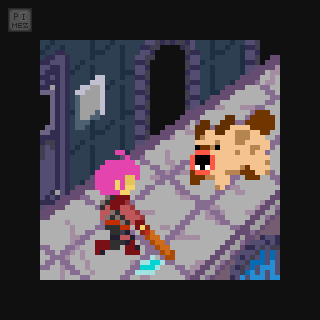
Big thanks to Pimez who's taken on watching over the reddit community as moderator. He also combs the other communities and makes sure I see every new art piece. Despite juggling his own life and all these tasks, he still found some time to draw.
Pimez's piece reminds us that just because the new game's out doesn't mean we can't still celebrate the original flash game. The jail dog is a dog found only in jail and only in the flash game. I imagine Gail is just tossing a stick, and they're playing fetch.
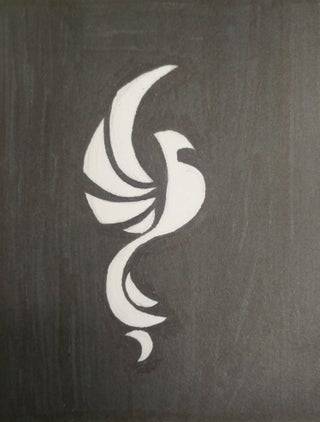
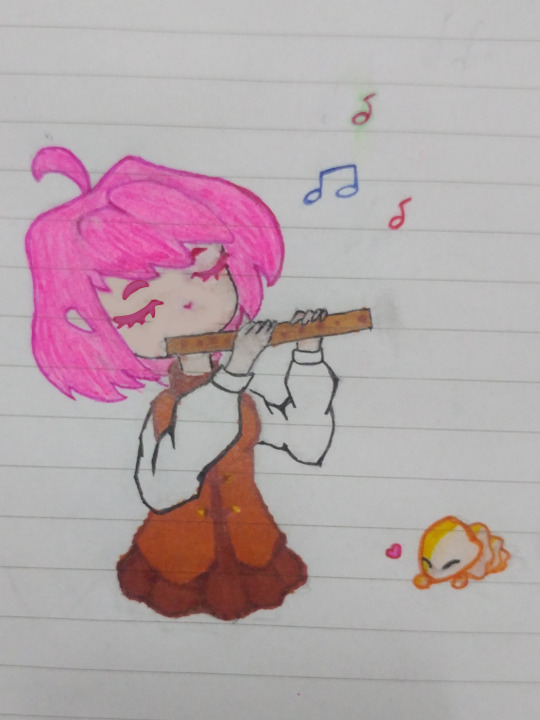
A new artist to this scene æv draws both the Phoenix logo AND a super cute picture of Gail playing the flute. So precious, you want to pinch her cheek. Even the Sand Drake is enthralled!
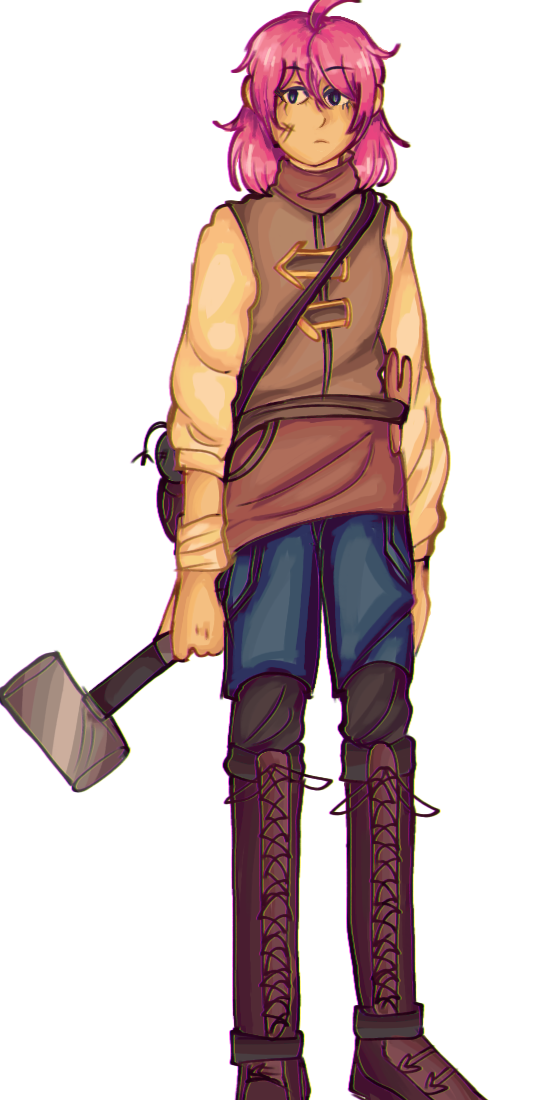
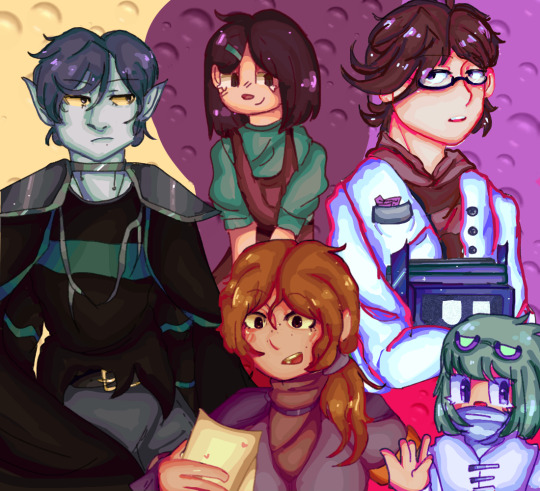
Another new artist, beet4ppy arrives on the scene with two pictures! One features a no-nonsense battle-hardened Gail looking stoic and tough! Kinda reminds me of Vinland Saga actually. The other, a more cheerful group composition - I must say I'm a big fan of Fran's classic anime-style eye!
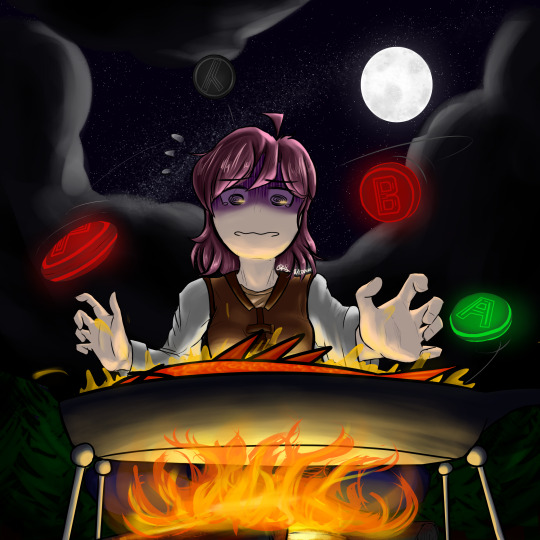
A returning artist, Cody G, returns with a picture depicting the tribulations of cooking. Gotta love Gail's frantic expression! I've heard the complaints, which is why we've added an option to slow the cooking mini-game down. An improved button font is also on the way.
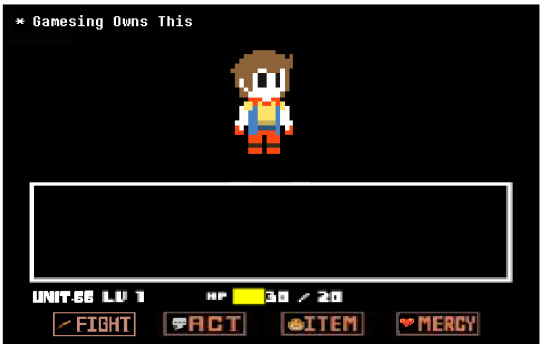
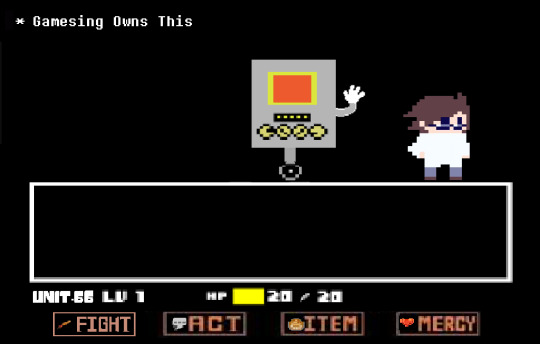
Gamesing with two undertale x phoenotopia crossovers. Thomas being a robot builder makes sense taking a role similar to Alphys. But why is Alex dressed like a clown? Perhaps there is a hidden meaning here...
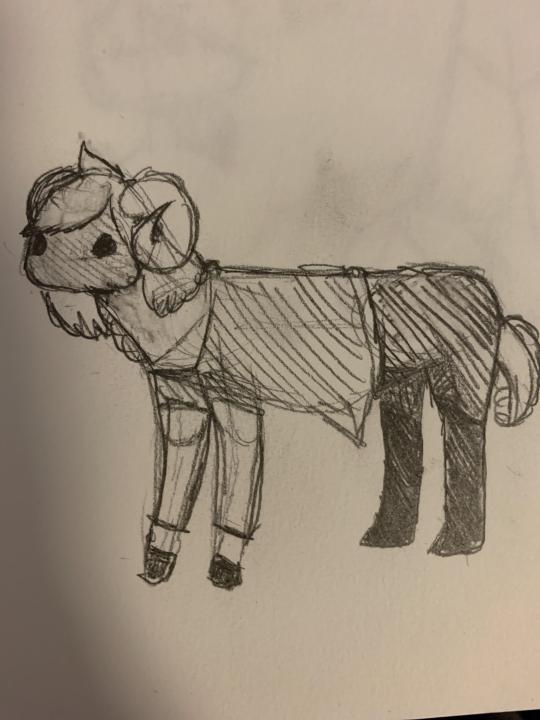
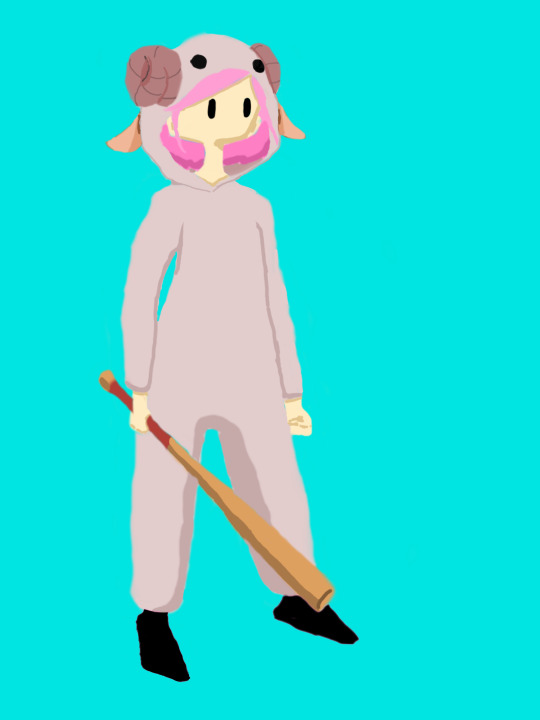
A new artist, Warotar, draws both a pooki wearing Gail's clothes and Gail wearing pooki clothes. Awww. The pooki is a bit scary - it kinda reminds me of a tragic event in a certain anime. But the Gail is adorable!

POL#5655 submitted this one to KM's discord which made its way to me. Here, a stylized Gail appears unnerved by the dark red eyes stalking her in the background. Are they bats or something more sinister?

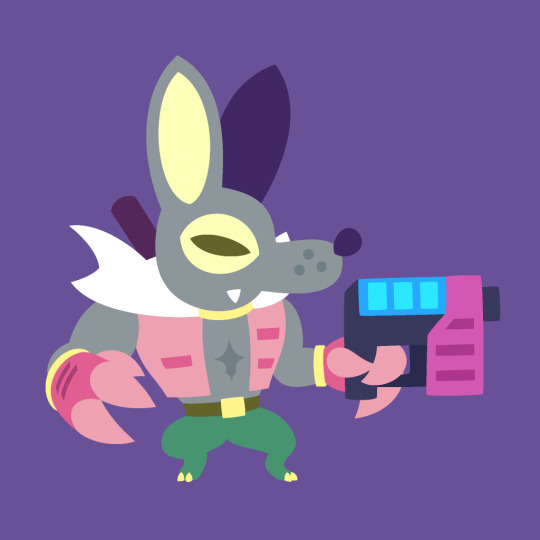
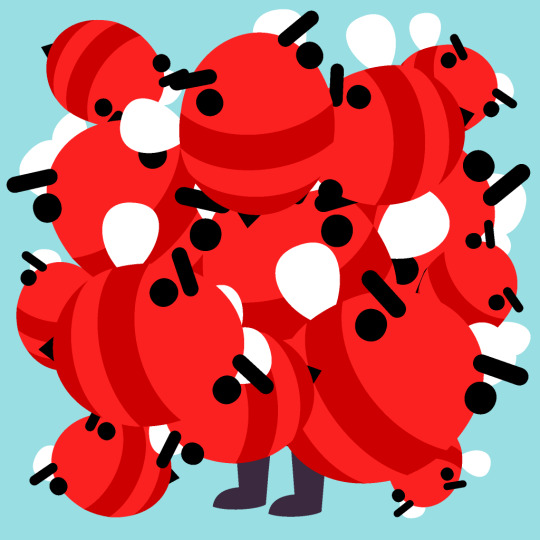
A new artist, MilesCPW, arrives on the scene with three rare well-vectorized arts! Love it! One scene depicts Gail balancing a bomb on her head - that's a speedrunning trick I only learned about recently after someone emailed me a video O_O
The other drawing gives us new insight into Katash - he could actually look cute if he wasn't trying to kill you.
And the bees... Okay, this one got a chuckle from me :D
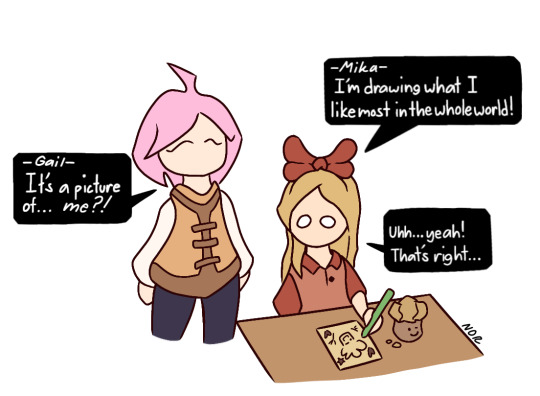
A returning artist roccy_chair draws this heart-warming scene from the beginning of the new game. Aww. Mika doesn't get much screen time for story reasons, so it's nice to see her represented.
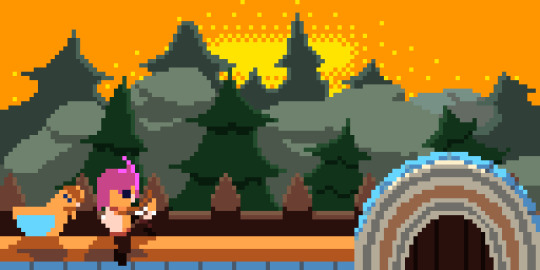
UnrealWorld_32 returns with another drawing of Gail in Panselo, this time capturing a more idyllic time. I like the tranquil nature of this piece. And Gail does in fact play the guitar, denoted by the guitar in her room.
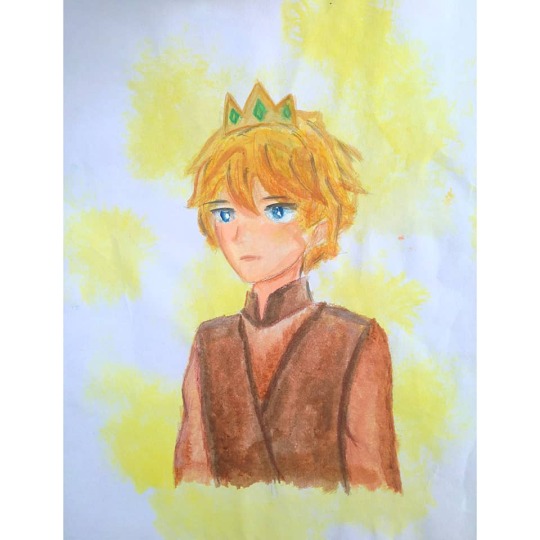
Returning artist shafiyahh draws a nice portrait of Prince Leo - looking regal and princely. I like the storybook art style of this piece. It made me immediately think of "the Little Prince" - one of my favorite books actually!
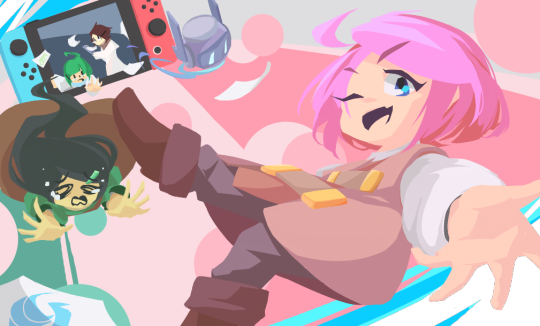
Negativus Core returns with a beautiful group composition of Gail and the gang - flying from a Switch shaped window - totally sensible considering the game is only Switch right now. As usual, I'm impressed by Negativus Core's use of challenging angles to frame a more dynamic shot of the characters. Great job!
And it wasn't only artists bearing the banner. I'd like to give a big shoutout to everyone in all the game's little communities (from the reddit to the discords to this tumblr). I've seen this community help newcomers with gameplay and walkthrough advice, discussions, updating the wiki, and so on. It does bring a smile to my face. Thank you everyone!
60 notes
·
View notes
Text
On Comments, feedback anxiety on both the writer and the reader’s side
If one could look into my WIP draw, or take a glance at the fics I’ve actually posted, it becomes clear misunderstandings based on miscommunication is something I seem have a thing for. In all honesty is more of a lifelong study and recurring theme I keep stumbling on or consciously walking into. Preface: I am only human and mistakes can happen, but usually I try to handle the detailed label (also referred as Read the Tin or as written on the tin) of major warning with my writings that is usually missing in any other aspect of life, sort of a lovely user manual/preview so one could know to walk away before getting invested or worse triggered.
Or at least know exactly what they signed up for.
Is it perfect? No but at least it’s there, as a writer I did all I could to avoid unpleasantness, the rest it’s up to the reader’s discretion. Which leads me to the heart of this post: comments, feedbacks, criticism, politically correctness, manners and the anxiety they produce in both the writer and the reader.
The picture is big so I’ll divide in sides, but remember that people are made of multiple sides, and sometimes those sides are at odds or outwardly warring against each other. That’s pretty average for any irrational human being with emotions.
From the POV of an overthinking anxious writer:
1) Ao3′s Kudos are sort of like a watered down thumbs up, after about 4-5 fic posted (or ~15K words of stories out there to be consumed), they became the kind of anxiety triggers feeding thoughts of why so many people/guests left a kudo but the story wasn’t good enough to warrant the time of a comment/review 2) Comments are lovely reminder someone found something in your words that made them react so strongly they felt like sharing that reaction with you was worth their time.
2.1) Comments are also the cause of anxiety about their content before you have the courage to read what they says...
3) Criticisms and feedbacks can be a wonderful tool to improve your writing for the next story. But not if they are laced with insult, personal attacks in that case they are the kind of black hole that pushes people to stop writing all together, or at least stop sharing what they write.
4) single emoji (♥), 2 char long (<3) comments takes years of effort and a lot of conditioning to remember to slip in reader mode and appreciate the effort it took to stop and do even that, instead of allowing doubts to gnaw at the back of your head with waaaiiiiit that’s all? was it good? was it bad? arrrghhh what does it even mean???
5) Statistics and numbers, those are the evilest of the most buggering things and the most vile tempters that will push you to compare your stories against others (a futile exercise in frustration and pointless reason to shred one’s own self confidence to the tiniest of pieces for literally nothing)
5.1) Especially when you have two writing mind frames:
writing the stories you want to read (and usually it is either a niche where you’ve already consumed all you could find so you write it because duh, more content might ignite back the fire please, or you haven’t found yet someone to say it how you want to read it) vs what I simply call
exorcism writing (the kind of free therapy exercise when something is bugging the heck out you and not leaving your mind so you put it down to words and then let them fly free, instead of trapping them on a diary you’d just return to read and start the vicious cycle all over again)
5.1.1) and your exorcism stories become more popular than the stories you want to read, because at the end of your raw ranting exorcism you managed to write something that would end up falling within mainstream tropes. Which just makes you sad because those were not the result of love and planning and endless hours of writing and editing that you put in your other stories.
6) I’m not writing fan fiction to be an educator, it is possible that my day job is being an educator, but unless I’m there writing textbooks, as a writer it is not my responsibility to teach the reader something that has to be authentic, realistic and a good practice. I’m just here to tell a story. Or are you really telling me that you watch superheros movies and series and expect them to appear outside your window? If you just laughed then why are you looking at fanfic smut with the expectation of finding a more interesting and alternative way to have a sex ed lesson? If you subscribe to the school that a story has has to make sense... Let me ask have you ever read some of the greatest literature works like Frankenstain, Moby Dick, The Hobbit, Journey to the center of the Earth, Alice through the looking glass, Aeneas, if you did and subscribe to “fiction as to make sense” then please please enlighten me I’m rady to sit back and hear all the points you can make how any of those are realistic representations of how things go. If you says that those are just stories told oh so long ago... Lets pick more recent ones, the Harry Potters books, Goosebumps, Twilight, The Shadowhunters Chronicles, 50 shades of , all those are listed as fiction which yes sadly too many used as a portrait of theme touched in there as realistic because the story was not set in a fantastical world and made the mistake of treating a work of fiction as a documentary... Sorry people I’m a writer, choosing the right words matters, words meanings and definitions matter please learn to think critically, and learn your words, there is a difference between fiction and documentary 6.1) At the same time it might be that I am the kind of writer who loves to add factually authentic things in my writings, someone who actually had spent hours and hours on research to make sure that what they have been writing is not utter and complete made up rubbish, and that’s ok too. I do not expect readers to assume it is correct or that it is purely made up, and if someone is curious they could use the comment to ask a question, I’ve never turned out a curious question, even when it was difficult to answer it
7) Just because I am writing about something, it doesn’t mean I support it... Again those are stories, not a scientific report on a lab experiment, I can write about abusive relationships, doesn’t mean I support them, I could write about self harm or depression, doesn’t mean I am encouraging those behaviors, in fact those usually come with a Trigger Warning, why? because a reader should have the option to walk away from what should be just a moment of pleasure and relax, not finding themselves triggered because I didn’t want to spoil the surprise of what was going to come in a story posted on the internet... 8) This far I’ve personally chosen to not push for comment, no beg necessary, I decided years ago to be the kind of self centered bad ass who writes for themselves, who’s not going to dangle the promises of more chapters in exchange for comments, I dislike the practice, and I find too exhausting shouting left and right hey hey I’ve written this read it read it... So I do get why my stories do not have such a large audience, it doesn’t help I’ve actually posted way less than what I’ve written over the years. I do welcome comments, though I have no clue on how to respond to short ones, or a single emoji/<3 to all chapters to those I end up answering only to the most recent one of that person and thank for their support. Longer comments are easier to answer because it gives me something to say back or comment/thanks for, though it becomes weird for me when someone speculate on future developments in what they wish to see, and since I’ve recently adopted the policy of posting only completed stories (even for the chaptered ones that will not be posted at the same time, the number of total chapter is not an estimation it is exactly the number of files I’ve divided the story into for reasons) because I do know whether something of that sort will happen or not, and I don’t want to put someone out of my story if they are too invested in see what they imagined happen... Though as I do write stories I’d like to read I’m quick to encourage aspiring writers to feel free to take that what if and work with it, just to please mention that my story inspired theirs and that I’d love to see what they come up with. Constructive criticisms, I do not have a beta for most of my works, I do not work too well depending on other people’s time, I confess even in the past I received criticisms that were not constructive if we push the boundaries and call those criticisms rather than just plain old complains, which is sort of the reason why I stopped explicitly encouraging communication. Because I do expect respect, you don’t know anything about me or what I believe in, you might make some guesses from my profile because I haven’t been shy and pretty open on them, but I won’t accept being personally attacked or talked to in a disrespectful manner just because you didn’t like what I wrote. I have no problem accepting criticisms, as long as they are criticisms and not just whining. You cannot come to me with “I hate your story” and leave it at that, you already took the time to express your opinion instead of simply walking away, the least you can do is explaining why... Otherwise I seriously don’t get why you wasted both of yours and more importantly my time and energies... From the POV of a spoonie reader who barely has the energy to read: 1) Ao3′s Kudos are a life saver that allows you to show your appreciation (even if you are allowed only one as registered user) with only a click (and some times even that click takes so much out of you) instead of relegating you to invisible reader, barely visible number (*coughs*ff.net*coughs*) or forcing you to make a story a favorite/followed
2) Comments are the source of anxiety, because you might want to show support but would they get that or would it sound strange? will the author understand that a a ghsafdgsakdjfh (read: key smash) happened with excitement and love and you’ve no other words to express it? 2.1) also trying to put your support in words when you are in your pj cozily being a blanket burrito and reading from your phone in bed because there’re no more spoon left for the day it’s hard
3) The author asked for R&R, or welcomes comments and constructive criticism. You loved the story enough to spend energies to
point out things that were plain plot hole or downright inconsistency or lose ends, pointing out botched translations from your own mother tongue and offering correction that were not google translated, in ao3 case pointing out lack of some appropriate tags, which would have 1 improved your story’s visibility and 2 allowed the reader to choose whether they wanted to read it or not both points that would have benefit you as author...
Only for the author to react:
- badly with a why are you such a nitpick hadn’t anyone told you that you should just stay silent if you have nothing nice to tell me? - Excuse me you’re the one asking for my opinion not my adoration, I gave you exactly what you asked for, if you cannot handle your work being nitpicked or the holes in your plot being publicly poked then there’re fabulous people called Beta reader who will give you the needed dose of though love in private get one..
- badly with a don’t like don’t read - legit reader’s counter point is I wouldn’t have read it if you had given me a way to know then what I discovered now [personal addendum, on a not that well low energy day it takes me less about 3 mins and half to read 1.5K words don’t came at me on your 1k long story and tell me I could have stopped reading when I noticed it wasn’t that good for me...I was done with it before I could get any warning]
- dismissively because a meet cute clearly is an AU - Bless your heart if you need me to point out to you that there is a difference between an Alternative Universe (AU) and a Canon Divergence and the fact that meet cute is a trope which in fandoms usually implies different circumstances within the fandom’s canon world of the first meeting between the characters in the main relationship but doesn’t automatically include different premises for the character example:
in canon: characters from a magical supernatural fandom one a wizard with magic, one a fighter with superhuman speed and holy weapons, in their first meeting the fighter saved the wizard’s life.
in a meet cute: a wizard and a fighter with superhuman speed and holy weapons meet in the middle of the forest where the fighter was hunting for food failing miserably and the wizard took pity on the fighter and offered to share their dinner, if the fighter dared to step inside the wizard’s home
in a No Power/Human AU meet cute: where there is no magic, one of the two is a barista who uses flirty coffee jokes lines to call the other’s person order, and finally discover they are an accountant so instead they start using math puns to get the accountant’s attention.
Those are all valid stories but as an author don’t came at me believing that just because you mention a trope that is enough to distinguish between the 2° and 3° examples, or that having mentioned the trope gives you the standing to look down at me if I do have my own reasons that you do not know about for wanting to read only stories like the second pitch and get upset but still tell you in a polite way that there are missing tags in your story, especially when you’ve falsely advertise your 3° like pitch as if it was a 2° one and I get upset and let you know about it and do so with the curtesy of signing it with my name rather than leave an guest/anonymous comment
- shrugging off issues with the tags with a Oh but I’m bad at tagging -
then I have 3 things to say to you buddy one) that’s not an excuse if you haven’t learnt how to do it yourself get a beta, get a friend, read more and compare what your story tells with a similar one and how that one is tagged, there’re ways Ignorance is not an excuse;
two) you can’t claim you’re bad at tagging but then refuse to listen when someone is pointing out to you more tags for your story, dud learn how search engines work, searching by tag is basically having a filtered search, the more tags your fit your story the more venues your story can appear in reader’s search for something to read... which means visibility for your work, are you really telling me that you dislike to have that and would prefer less people reading what you post? then sorry but I think you’re doing it wrong and should get a diary instead, not post them on the internet.
addendum: still claiming to be bad at it after having posted over 40 stories and all posted in recent times in the span of a couple of months, just suggest you lack the intelligence to learn how to do things. Which only encourages me to never ever get close to your works, certainly to never promote or share them if not actively discouraging my friends from spending their time on them.
three) and guess what? there is a frikking I'm Bad At Taggingtag for that too!!!
As a reader I might be ranting in this post, but the long effect of those is a growing apathy and increased unwillingness to spend my energies for commenting unless I’d really really really really liked or loved a story, or I have something more than a one liner to share, which while I intellectually know it might be unfair to let the whole pay for the disrespect of few, my own survival instinct is glad I’m not spreading myself even thinner...
truthful disclaimer: in all fairness it has been my experience, that those reactions usually come from authors with already quite few stories or a decent word count out there.
New authors are still very much enthusiastic and happy about even the smallest crumbs of recognition or encouragement, which in return is lovely because it recognise that my own time and energy as reader are worthy, that it does take effort to share an opinion or encouragement or suggestion.
4) The author might never know how that day I posted that single emoji, or two character <3, it was one of those bad days when even opening a small water bottle to swallow down the painkillers was too much, when using a finger to scroll down the page to reach the end of the story had wiped out more energies than I could really afford and yet I still pushed myself to leave a sign that I was there and appreciated their story
5) readers should be allowed to have the “if you thought writing was hard, try commenting other people words” tag... because sometimes especially on older platforms (yes ff.net I’m looking at you) as a reader I can’t find the energies to wipe up something to say so I become a silent invisible reader. And sometimes it’s really that I am able to stand only stories with certain characteristics, personally for example I do not have the emotional fortitude to read more a certain amount of Work In Progress at the same time across multiple fandoms because my brain can’t recall all the details and I might not feel to rereading the story from the beginning every single time there is a new chapter... 6) Maybe it’s because I’m way out of my teens, maybe it’s because even in my teens and before stories were my safe place, my escape, I do not expect things to be factually correct in stories, but I am a logic driven person, I will see those plot holes and I might even poke through 'em if I find your story good enough that I feel it would be a pity not pointing those things out. You cannot tell a classic vampire story (not the twilight kind of sun sparkling vampires but the sun burn me to ashes kind) and have your group of vampires prancing about at noon of a clear summer day without some sort of reason for that to work. I promise you, I’m not picky, I will accept ridiculous reasons like they were standing under and umbrella covered from head to toes and none of their skin was exposed to the sunlight, but do put the effort to give me a reason why I should believe it was intentional, or do not cry and complain if I do decide to point out dude you’ve normal vampires that are sunbathing and did not become piles of ashes that’s not plausible... 7) Stories are just that, something to listen to, they don’t have to have a moral for them to be worthy of being shared, they don’t have to be a mirror of your thoughts, or they could be a mirror of your beliefs, and if I am commenting on them I’m commenting on the story itself not your connection to it. And I do need you to advertise in advance if there’re things that might be triggerish, because what might be just a mental exercise of stepping outside your shoes, if not done might result in me walking into a panic attack while maybe I was just recuperating for one and trying to find comfort or a distraction. While I as a reader cannot know you author and where you come from, unless you want to make an ass of u and me do not assume you know where I am or what path I’m walking in my life as a reader. 8) I despise people telling me what to do, especially if I didn’t ask for an opinion... If someone (who doesn’t have an economical or authorative position over me) demands me to do something the chances I’ll be do it, especially if I was going to do it before, become nil instantaneously. I’ve been running and lurking in writing circles and fanfictions for closer to three decades at the time this is being written, and from the very beginning I found disgusting and deplorable the practice some authors adopted of bargaining reaching certain numbers of comments/kudos in exchange for the next chapter. I can respect an author saying I don’t want to get this or that, but the final result is that most likely I would walk away without commenting even if it would have been a story I would have otherwise supported. There’re few authors I do know personally, at least superficially through other channels, that have this kind of disclaimers and I still comment. But that’s because I have an appreciation and will to support the person themselves who also happened to be authors.
#long post#LLF inspired#LLF Comment Project related#comments and feedbacks#personal rant#listing differences#between what I write and what I believe#between what is fic and what is reality#between writer and reader mentality#between writing the stories you want to read and exorcism writing#talked about with a pinch of humour#ok maybe dark humour#have I spent hours and probably more spoon on this than it was healthy?#probably so#but it was worth it#or so i hope
2 notes
·
View notes
Photo
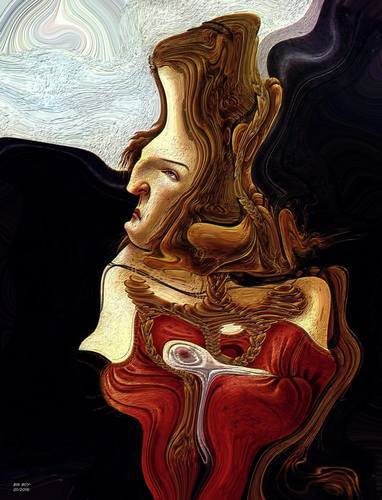
... La Bohème - Original !, Igor Bajenov
..... New in Service Investment Type Please -Company by Russ & Luxury -Gallery itself without foreign mediation the Perfecte Auctions Photo Art (unique / original) ..... which will cost a fortune in 5-8 years every time Art Auction Worldwide! ....... Take more favorable to buy the opportunity and you save real Money. Printed on Luxury Photo Paper 310 gr/m. Comes with certificate of authenticity numbered and signed.....What is art? .... "I am art." Definition of art: Art takes on complex relationships in all areas of life, and more creative perspective answers the spirit of Indiviudalität match in itself and draws from the collective Gedächntis and understanding of the world. Art is thus the only acceptable form of conflict develop culture and politics real and visionary. Art is communication between Mind and me ... me and my work ... my work and the next reason ... Art is thus an entertaining evolierende chain reaction. Perhaps Art Evolution? Art = The past, present and (or) future in their wide range of colors, shapes and sounds to show. For me, art is a form of expression of thoughts, feelings, emotions, but, unfortunately, often by commercial interests. You may be wondering now, what I mean. So I explain it to you. An artist per se, every human being is of creating something that he thinks is art. Whether it was written, painted, sculpted, forged, declaimed or otherwise prepared. The important thing is that there is, therefore, the work that needs to come out from the inside of the creator and that it precisely the man who created it, considers art. Because True art can not be obtained on head pressure or with an order one. Art is about the Muse. Yes I know that word is prejudiced, one connects it with ancient myths or just one or a lover, or the places the artist in a state feely. But, just that it is not, is not it. The Muse is a kind of phenomenon, rather a feeling that you wanted to give a figure in ancient times. A muse is a burgeoning idea, an association or even a clue to something that you will create. In any case, the true artist, and thus the true art has this to do something as the origin, which inspires from within something. But now the company set up an ad hoc basis have created something comes want. Of course, it must be great, stunning, new and convincing. Simply put, something gigantic that all ideas met, if not exceeds. And here starts the second part of my statement. For now I ask you, if as I just said, art comes with a Muse. How can they then with a contract, no matter by whom issued, be created? The artist who is perhaps known for his works from his musical creative phases, is now to create something on command and although it is possible and often even artistic nature. But it is a work to order. If you ask me, write me a poem or write me a story, because you had the pleasure to read one of my works and I liked you. So I tell you simply "NO" because I do not live it. But the one who has chosen the art as bread and life merit. Must say "YES" and it is also. See also commercialism "creates" art, but whether this works really should bear the title of art or rather commissioned art or just work? In my opinion, they should be demoted because they reduce the art in its value. I'm not talking about artistic taste, because even though I like better than a Monet a Beuys, so I have to both recognize as art, as they both emerged from such an idea. Art is self-realization, art has only the feelings of the artist is no longer expressed, and no less, is not about beauty !! For me, art is a form of communication. That is, the artist expresses not only his feelings, but wants the people with his work say something. He / she does not spontaneously and unwrought but processed so that it is understandable and enjoyable for the reader / viewer / listener. But sometimes even the incomprehensible pleasant or the unpleasant is meaningful. This art is a dialogue and not a monologue, I think it's also important that the artist has contact with his audience and the feedback takes care about what is normal for live performances, for writers or visual artists but should be. "Art is an expression of their own culture" Art for me is a kind of self-realization and liberation. Maybe even a little criticism. If you can do something that few can. - Everything is art - Survival is -life Art is art - Art is dying - Laughter is art - is not to laugh Art - Whining at a high level is Art .- Not whining is Art - Doing nothing is art - Art is thinking - Non-think is art - Everything is art so art is nothing other than art. Geez. Art is free figures from free spirit Art is a zweckfüßiger Sunrise in sausage glow of its own frequent lightness. Waiting a herausgepurzelten cheese princess on the verge of a frog loose Vaginalbrunnens. As the name of the site says it all: "Everything is art" The way of individual lives, loves, suffers and works. Then, when someone else may well something special, can he used his art to others to enjoy it. Art transforms people through images, archetypes and Symole. Art touches feelings and emotions. Art awakens to new life. Love Art curious joy, here is my proposal for the characterization of the concept of art. Art is the art with the help of a medium, for example, (music, painting or even mathematics) to develop a language all its own. The use of these media is only once "only" a craft. In conjunction with an idea and creativity arises from art, but can not be shared must be shared. "What is art" This briefly worded question is deceptively simple. Anyone who jumps up in his mind to do here made known, should know that it enters one of the oldest areas of employment of mankind. And seen do this from the perspective of those who art or take claim for themselves than buy from the perspective of whose who like art to be such, and some of their "understanding" and last but from the perspective of those who , judge the art or rather the art critics. The description of what is art, therefore highly dependent on the angle of view of the art actors. So art is for the artist or the artist certainly a form of expression for feelings, observations and findings. To convey a message where / her importance to him. How high is the acceptance of his / her work of art, is probably secondary. Here the enthusiasts want the discussion to the "true", respectively the "not-true" artist probably connect, this is here, however, inevitable. For the art viewer contrast, our own perception is crucial. The must not be congruent with the embassies of the artist / the artist. Well made possible by the artist intended message is hidden and yet he feels / she addressed herself. He / she buys a piece of art and presents / suspended / installed it in the habitat or visited an idea and takes the seen and heard with. Here interested feelings, observations and findings of the receiver. Seen one can understand art as a form of communication that makes visible Contemporary and contemporaries in a special way and consolidated. Whether see future generations yet to be connected to these messages, is debatable. Modern productions of Shakespeare, Schiller and many other throw such discussions again and again. Interpretations of paintings or sculptures can vary widely. And yet the art manages the employment of people with himself and his environment Oscar Wilde is certainly correct when he says: "Art is the strongest form of individualism, which knows the world". But it is without doubt the individualism with the largest collective benefit, I mean. Art does not rely on evidence and free. Your freedom is the perfect fulfillment of the self-determined shape. Their quality is determined only by itself. The created is absolutely and belongs to humanity. Art is a way to escape from reality for me. "Art, I am.".....Exclusive Photo Portrait in Modern Art- Digital Photo Mix in Fine Painting Art - Abstract/Expressionism-Surrealism-Figurative/Paint/Drawing-Vector/Graphic,
https://www.saatchiart.com/art/Photography-La-Boh-me-Original/462428/2777815/view
1 note
·
View note
Photo
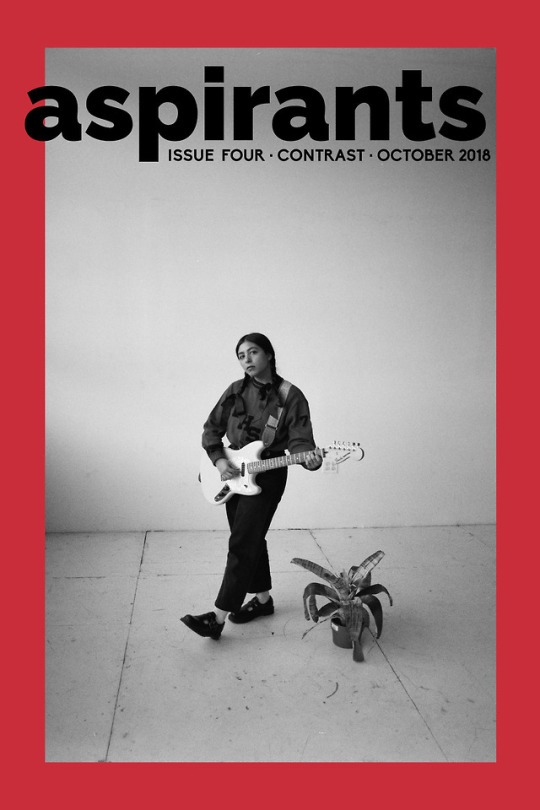
CHALLENGE ACCEPTED: THIS IS HOW GEN-Z RESPONSE YOUR CRITICISM CREATIVELY
Sometime ago, Instagram recommended us to a magazine called Aspirants Magazine. Their instagram account is heaven for visual enthusiasts, with alluring color grading and beautiful portraits. Let alone, their commitment to pick interesting individuals to be featured. We contacted the editorial team and that was totally surprising to know that they are juggling this promising magazine with high school and managing the task mostly through computers and internet connection.
We ended up talk to Danielle (D), Ndemazea (N), and Ry (R). So, prepare yourself to erase pessimistic ideas about millennials, specifically gen-Z, as they definitely do things and make changes too. This is #GIGCHAT, please enjoy!
Tell us brief history about Aspirants Magazine? Also how do you manage the task among you three?
D: Aspirants is an idea I had bouncing around in my head for a couple years before it was realized. One day, I was waiting in line in a grocery store and took note of the magazines and tabloids on the rack in the checkout line. I started thinking about how celebrities we’ve all seen hundreds of times before repeatedly get the spotlight. What about that person—that musician, artist, model, actor, filmmaker, photographer, athlete, what-have-you—who works just as hard but just hasn’t been given the same opportunities? Doesn’t every hardworking creative deserve a chance to be on the front cover of a magazine? I think they do. Hence, Aspirants Magazine.
N: As cliche as it sounds, my involvement in Aspirants can be pinpointed into one specific instance: a text. I had received a message from Ry and Danielle talking about an idea they had been working on for a while, and from the moment I heard about it, I knew that Aspirants was something different and special. Naturally, with that in mind, I sent my response. The rest is history.
R: Aspirants works to spotlight creatives who never really have gotten their time in the light before. By doing so we are also acknowledging differences such as class or race that lend themselves to differences in perception and experience. In terms of managing tasks, we have delegated roles among the three of us and team members that work with us on each issue. Ultimately though, everyone on the board is sort of a renaissance person in the sense that we’re all able to help each other outside of our delegated roles if needed.
Do you consider/refer Aspirants to be called as magazine or zine?
D: In terms of the publication, we prefer to call it a magazine. However, in November we are expanding our brand from just Aspirants Magazine to Aspirants Co, so you may refer to us as Aspirants Co!
N: We prefer to call the publication a magazine!
R: Publication is a magazine!
How do you choose or pick artists to be your feature story?
D: We keep a log of artists we collectively update. Usually, we’ll stumble across someone on social media or across the internet and recognize their good intentions and good work. Additionally, submissions are open for every issue!
N: It’s probably the easiest part of the job. The internet has made it easier to share our talents, and with so many talented people in the world, we don’t have to throw the stone very far to find leagues of people to feature. And of course, sometimes those people come to us.
Other than musicians/artists, do you also bring up socio-political activists in your magazine?
D: Aspirants in itself tries its best to be nonpartisan, but we aim to amplify the voices of those who are fighting for what they believe.
Among artist/musicians/figures that you feature and interview, what you could learn from them?
D: So, so much! I’m so inspired by all of them. For example, I interviewed Maunder, a musician featured in Issue Three, and what he had to say about his music really inspired me. His music emphasizes honesty. To me, also patience. He wasn’t in a rush to release music just because he could; he took his time until he felt comfortable to do so and is now making awesome jams. I think I need a reminder that sometimes it’s okay for me to take my time.
N: I’ve learned so much from each and every feature we’ve done, but as a whole, I have seen that there’s nothing conventional about being an artist. Each issue will show you multiple ways to express yourself and there’s no wrong way to do it. Our features have taught me that being genuine is key to success.
R: Each of the creators featured here are inspirational. At their core, many of our creators emphasize other people. They emphasize community. I think that we—as a publication—are incredibly privileged to be able to work with creators who so closely share our vision.
You also make a printed version of your magazine, how do you distribute it and how do you perceived the printed version ones in this digital era? Anyway, for me myself, printed magazine might be bulky and spacy, but it really feels nostalgic and real, we love it.
N: We distribute and publish our magazine with the self-publishing company Lulu. For us, the difference between looking at something online and holding something in your hands is immense, and everything feels much more real when you can touch something that you’ve created or see your face on the page.
Do you guys do this magazine as a side project and looking at the development, do you consider to make it your full time focus?
D: We’re juggling the high school grind alongside this company, so I suppose it could be considered a side project for now, but I think all three of us want to be able to make it a full-time focus of some kind.
N: Aspirants is a full-time job that, because of the aforementioned high school grind, is our “side project”. But it’s our passion and as soon as we can, Aspirants will become a full-time gig.
R: Right now, Aspirants is a side project in the sense that I’m currently in high school. However, Aspirants is honestly something I always have my mind on, and it will always be one of my top priorities.
How do you create and manage this team, as for some reasons finding and having people with the same amount of passion and sacrifice for something like magazine or blog or certain projects with almost zero profit (in the beginning) is quite hard?
D: Google Drive, ClickUp, and Discord. Without those three applications, we’d probably be significantly more scatterbrained than we already are. But to delve deeper, the passion thing is a great question. I have a lot of struggles with mental illness so finding that passion is often difficult. However, I just try to keep in mind that I have people counting on me and people that have been positively impacted because of what I do. It allows me take a deep breath and move forward, even if it’s slowly. Profit was never the ultimate goal to us. We agreed on that when we started. It’d be a great benefit and it is an aim, but it’s not endgame. I don’t rely on Aspirants for income, and I hope one day I will, but in the meantime I am okay with where things are now.
Now, what advice you would like to give to anyone/readers who wants to create change and inspirations through media or magazine specifically?
D: Find some people you trust and can bounce ideas off of and go for it. Get feedback, work hard, and take advantage of your resources. We live in an amazing transitional age of technology where each and every one of us has an opportunity to create something unprecedented through the internet. Use it.
N: Never stop creating. There will be days when you feel like it’s not worth it and there will be days when you want to quit and there will be days you will lie down on the ground, staring at the ceiling, wondering why you ever decided to start. But it’s worth it. Because there will be days where you’ll get a comment from someone giving you a compliment on your work or you’ll sell your first piece or you’ll have a larger turnout than expected at your event, and you’ll realize why you do it. And you’ll keep going.
R: As cliche as it sounds, I would tell people to just start doing. It’s different for each person depending on our access to certain things but ultimately, get started in whatever way you can, as soon as possible.
We really love your social media and website layout also art works, they're really cool and we fancy the color grading.
D: Credits to Ry, the one and only.
R: Thank you so much!
Last, share your favorite songs/musicians/music with us!
D: Dude, that’s like the hardest question for me to answer. Right now I’m digging the music of Disclosure, The Internet, MANON, and Twenty One Pilots’ new album. You can keep up with my favorite new music on this Spotify playlist.
N: “Favorite” is a hard word, but if I have to choose, it would be any song made by Noname ever. She’s a beautiful artist that has done nothing but be true to herself, and her newest album Room 25 is a work of art.
R: I honestly can’t tell you what my favorite songs are—this is an incredibly hard question to answer. At the time being though, my favorite song is Generation Why by Conan Gray.
Aspirants Magazine is online and printed magazine. Order here if you’re interested to purchase their publications.
#gigchat#interview#magazine#publicist#music magazine#artists#musicians#journalism#journalist#gen z#millennials#young people#youth#music blog
5 notes
·
View notes
Text
Password to your Heart

Pairing : Junmyeon x Becky (my friend Admin B from @noona-clock !)
Words : 2k
Genre : Fluff, Hogwarts!Au, a little bit of angst
Summary : They do say stereotypes have a part of truth in them, and when it comes to the smart, nerdy, bookworm Ravenclaw and the brave, athletic, witty Gryffindor, it seems that this part of truth lies in Becky, Junmyeon and the cheesy crush they have for each other but will never admit. Or will they ?
Message for Admin B : It’s been a while since I’ve shared my work to anyone at all, but when Admin T came to me and asked me to do something for your birthday Becky, it was with great pleasure that I accepted. I honestly don’t remember being more motivated and enthusiastic for a fic than with this one ! Waiting a whole week for you to read this was absolute torture, and I low key forced a few of my mutuals to read some parts to have feedback because I wanted everything to be perfect. I truly hope you’ll like this. I wish you an amazing Birthday and year, you’ve been such a good friend to me B (you and T !) I’m so so glad I decided to follow your blog and that we became mutuals cause damn I don’t know what I would do without your writing and, well, you ^^ Hope you enjoy xoxo
“Password ?”
“What ?”
“I asked for the password you have to say for me to let you pass.” The portrait of an old, bearded man in front of Becky replied with an annoyed tone. “Don’t you know how it works ?”
The Ravenclaw frowned. The secret passages she’d use to arrive on time for her classes never required a password before, and she sure as hell wasn’t going to deal with Sprout’s wrath would she be late because of the stubbornness of a portrait.
“I’ve been using secret passages for seven years. How come are you the only one enforcing a password to cross yours ?”
“Because I decided so.”
Great. Becky thought while rolling her eyes as she tried to think of a way to pass.
After a minute that felt like an eternity of the girl’s dark eyes glaring at the portrait’s painted ones, the old man sighed, having seemingly gave up trying to get out winner of this situation.
“Are you going to stand here all morning ?” He asked, this time fear more present in his tone than irritation.
"Well that depends..maybe you could make an exception for me ?” Becky asked while doing what she hoped would look like puppy eyes. “It’s my birthday and I really, really, don’t want to start the day with a detention. Pretty please ?”
The portrait stayed silent for a few seconds, visibly weighing his limited options.
“Very well, very well.” He finally said, defeated. “Normally I would obviously have refused you access to my passage but as it’s your birthday...maybe I could give you a present for the occasion.”
“Look that’s nice but I really don’t have the ti-”
“Pumpkin Pastry. Happy birthday.”
Becky couldn’t help but carry a smile of content as she realized what the portrait meant and thanked him.
“Don’t mention it.”
“Sweets as passwords, though ?” She said sarcastically, crossing the passage’s entrance. “Isn’t that Professor Dumbledore’s thing ?”
“He stole it from me.”
Becky loved using secret passages. Yes, of course, it’d provide her with a quick and efficient way to move around the castle, but mostly she’d use them to be in her own world for a few minutes, or a few hours would she sit in the middle of the dark yet warm corridors to finish a book. And the best thing was, whereas wherever she’d be or whatever she’d touch in the gigantic castle had been someone else’s before - even her own bed - these long passages were that one thing that she and only she owned.
It’s not that she didn’t have friends or anything. Actually, Becky was well-liked amongst all Houses combined. Ambitious, loyal, friendly and smart, it seemed like the Ravenclaw was the best student and friend you could ask for. But that was the heart of the problem. Her problem. One might think that being this “perfect” brought the perfect life along, but truth was all it truly brought was the unbearable pressure of always hiding behind a flawless facade, leading Becky to need a break from the rest of the world pretty often.
Although her joyful aura was appreciated by many, there were still students at Hogwarts that rather preferred picking on the young wizard to see it finally break. Sometimes, they did succeed, but she’d never cry in front of them and instead would opt for hiding in a secret passage until the tears would stop falling.
And when Becky thought about who these bullies were, it truly didn’t surprise her that most of them were Gryffindors. Not because in that House necessarily lied meaner people, but because it was in that House that belonged Kim Junmyeon.
Ugh.
Only thinking about him made her want to throw up.
When she saw him sit on that small wooden stool, waiting to be sorted and nervously playing with his fingers when they were only 12 and had been in Hogwarts for no more than 15 minutes, her young and inexperienced heart had ridiculously missed a beat.
That was before he’d actually open his mouth.
Nowadays the Ravenclaw prefect saw Junmyeon as he truly was : the Gryffindor troublemaker. Always late in class, always with his tie undone - Becky had to admit it was kinda sexy, but nobody needed to know that - always picking on her and calling her “Becca” or “Becs” or anything that wasn’t what she liked to be called as...
The young girl shook her head. Trying to forget about all that, as after all it was the point of using these secret passages, she focused on the feeling of her fingers sliding against the cold stone walls when she was walking until, by turning a corner, she was stopped short by a jet-haired boy in front of her she recognized way too well.
His doe-brown eyes widen as they met hers, both of their faces distorted in horror.
“Jun-Junmyeon ?” Becky stammered with bulging eyes. “What the hell are you doing here ?”
“Becca ?!” He said, visibly just as shocked but also suspiciously uncomfortable and out of breath, as if he had been caught rather than surprised. “I...huh didn’t see you there. What’s up ?”
“I've told you a thousand time it’s Becky.” She stuttered trying not to look at the boy’s unsurprisingly undone tie and messy hair but only ending up turning red. “And you didn’t answer my question...”
“Why are you blushing ?” Junmyeon asked, quirking an eyebrow arrogantly as he knew so well how to.
“Just tell me what you’re doing here !”
The Gryffindor didn’t answer right away, and Becky could swear he was up to no good though investigating the mess he’d done 10 minutes before class wasn’t what she had in mind.
“I’m not sure that concerns you, princess.” He simply said, and Becky prayed she didn’t turn even more red at the nickname, internally confused at why it was suddenly so hot in the confined space.
“I’m a Prefect, so yes whatever you’re up to does concern me.” She tried to reply as sharply as possible. “However, I’m late for class and you’re definitely not on my priority list right now, so I’ll deal with you later.” And with that she passed him by, heading to the passage’s exit.
“Not your priority, huh ?” Junmyeon inquired as he followed her lead. “I’m hurt.”
“Just leave me alone, Junmyeon ! I already had to fight my way in here with a portrait, I don’t want to fight my way out with you.”
“Why are you acting all high and mighty suddenly ?” He continued, obviously having other plans in mind than respecting the boundaries the Ravenclaw was desperately trying to set. “I know you can be fun, Minseok hyung told me you’re always the one making people laugh in your common room.”
“Didn’t know Minseok was in your group of bullies.” Becky said, her mind racing at the thought of her friend telling Junmyeon about what she was like.
The back of the tapestry that hid the passage’s exit was now only a few feet in front of the two teens and, without even waiting for an answer to her comment, she accelerated her pace to finally get out of what seemed to be hell.
“I thought I told you to leave me alone !” Becky hurled, looking behind her shoulder at Junmyeon who’d seem to keep following her once outside the passage.
When she finally saw him stop in his tracks, the Ravenclaw satisfyingly turned around to look in front on her until she was stopped herself by noticing that the tall and imposant figure of her transfiguration professor was standing in the middle of the corridor, her green eyes staring at them both with reprobation and discontent.
“So this really isn’t my day, huh.” The prefect couldn’t help but say out loud.
“Professor McGonagall, Rebecca has nothing to do with this.” Junmyeon said, stepping forward next to Becky who, confused, was trying to silently ask the boy what he could possibly be talking about.
“Please, spare me your excuses, Mr. Kim.” The woman said firmly, her piercing gaze almost magically forcing the teens to stay quiet. “It is very noble of you to try to defend your classmate, but I am sorry to tell you that both of you, along with the other students that helped perpetrate this prank, will be forced to attend detention tonight in the Forbidden Forest.”
“What ?!”
“Yes, professor...”
“You must be kidding me.” Was the only thing Becky could manage to add as she watched McGonagall quietly turning a corner of the corridor and disappearing. “For Merlin’s sake, please tell me this is a dream.”
“Becca...”
“Pinch me. You have to pinch me cause I need to wake up I swear this can’t-”
“Bec stop !”
“No YOU stop !” Becky almost shouted to the point where the Gryffindor took a few steps away from her. “Minerva McGonagall just sent me to the Forbidden Forest on my birthday because YOU fucked up as you always do !”
The girl took a deep breath and didn’t speak for a few minutes, merely acknowledging Junmyeon who hadn’t moved an inch.
“So, see you tonight, right ? Can’t wait for the birthday party to start.” She finally said and with that she was stormed off without another word.
“Where are the others ?”
“They already went in, I waited for you.” Junmyeon answered quietly as they walked towards the dark forest, noticing how Becky’s dull eyes didn’t even bother looking at him when she sarcastically snapped back “too kind.”
When Becky was sarcastic, it was never good. Junmyeon knew that well. It was her way of protecting herself from him, from others.
How she’d act when he’d put a lock of hair behind her ear for her on purpose. What she’d do when he’d stare at her just a bit too long as she’d blame her cheeks getting red on her being angry instead of shy.
The teenagers both had a warm cloak over their uniforms, the Gryffindors eyes shining under the light of the Ravenclaw’s wand. The boy was trying to find a way of making conversation, but before he could say a word he was cut by his counterpart who was visibly feeling uncomfortable by the deafening silence too.
“Do you ever comb your hair ?” She asked and Junmyeon was taken aback by the weirdness of the question.
“I don’t know...I never really bothered, why ?”
“It’s been 5 years and it seems everyday is your bad hair day.”
“Oh, so you noticed that ?” He teased as Becky’s cheeks unsurprisingly started getting red.
She didn’t answer and instead looked away, embarrassed that someone now knew how, when she’d drift away and stop listening in class, it was him she’d observe.
Why did Junmyeon always had to make her uncomfortable ? She hated that. She hated him.
You started it. Becky thought only to curse herself for thinking that.
“What are you thinking about ?”
The girl stopped in her tracks, turning her head to look at Junmyeon who had spoken up and found herself destabilized by the way he was deeply staring at her.
“That this night sucks.” She muttered, trying to keep her composure by crossing her arms.
“No it doesn’t.” The boy softly said but shut up as Becky shushed him. “What is it ?”
“I heard a noise...”
“It’s probably just the wind.”
“Or a wild, big and hungry animal.”
Junmyeon rolled his eyes and shook his head.
“Whatever.” He chuckled, a smirk on his lips as he quicken his pace.
“Hey ! Don’t you dare leave me behind Kim Junmyeon or my ghost will haunt your ass !”
The boy slowed down but kept smiling at the thought of Becky opening up to him, being funny around him and, just, being herself.
Wasn’t it little steps that mattered most ?
“I’m serious though ! This is by far the worst way to celebrate a bir-” Becky tried to add but was cut off by the forest around her illuminating suddenly as all she heard was Lumos !.
With her mouth slightly opened, she saw garlands light up in the branches of the old trees of the forest. Minseok, Yixing, Irene, her best friend Seulgi and even Junmyeon’s own best friend Chanyeol were all there, holding a cake in the air with their wands and smiling at her.
“Jun...Junmyeon ?” She stammered, looking at the boy who had the brightest smile of them all.
“Happy Birthday Becs.”
For a few seconds no sounds would come out of Becky’s mouth. Until all she could ask was “Was that...your idea ?”
“It was.” Chanyeol answered for his friend with a wink. “And he owes me 5 galleons for helping making the cake.” He continued, but a simple glare from his friends told him to shut up.
“So...are we going to eat that cake or not ?” Yixing asked, and in that moment Junmyeon regretted he didn’t plan something without his guy friends.
“How about you start eating and the birthday girl joins you in a few minutes, yeah ?” He proposed, and everyone seemed to understand what he meant.
Everyone except Becky who couldn’t remember being more confused in the entirety of her life.
“I-I don’t understand.” She said, looking at the Gryffindor in desperation for an answer.
“Look, I don’t want to sound cheesy here, but I...I really like you, Becca. I wanted to show it to you tonight, with this birthday party in the woods and witg professor McGonagall’s help as..I know I haven’t always been able to do so properly before.”
“Yeah...that’s an understatement.” Becky murmured, letting out a sigh. “I’ve had a crush on you ever since I watched you during the Sorting Ceremony and...Merlin this is embarrassing.”
Junmyeon laughed warmly, embracing the young girl who stood stoic in his arms, unable to move from the shock of how her day went on.
“This is crazy.” She said, feeling weak, but was shut up by the chaste kiss that the boy put on her lips.
“Was that alright ?” He asked nervously, and Becky could swear the last time she had seen him this nervous had been 5 years ago when he sat on that wooden stool.
“It was perfect.”
“I meant if it was okay for me to kiss you, but I’ll take that too.”
It was the Ravenclaw’s time to laugh, and taking the boy by his loose tie, she pulled him against her to kiss him again.
“Huh Becky ?” Seulgi called. “Not to ruin the moment, but there are people...watching this.”
“Not in a thousand years would I have believed professor Trelawney had she told me this day would be real.” Becky softly said to the boy who was now inches from her face.
“Happy Birthday, princess.”
#exo#exo suho#exo junmyeom#exo xiumin#hogwarts au#harry potter au#k-pop#fanfiction#alternate universe#harry potter universe#hogwarts#ravenclaw#gryffindor
30 notes
·
View notes
Note
Could I ask you about your writing process? I've been working on my own series for a few years now and just wanted to know how you went about it.
Aaaahaha, well you should take my advice with perhaps a dumptruck of salt because this isn’t something I do for a living--only for fun, really. There are many authors on this site and others who are much more dedicated and work their butts off because this is their job, and I imagine they have a very different approach from me (because everyone writes differently AND because food on their table depends on them having discipline that someone writing solely for fun and with no deadlines might not need as much).
I use the software Scrivener to keep my books/series/research all in once place and easily accessed and in order. Lots of people just use Microsoft Word or even something like Google Docs or other free software, but I’ve been using Scrivener for a few years now and have now graduated to using it for my fics and such as well. It’s a GREAT piece of software and WELL worth the price.
It’s a bit like Photoshop for writing, though; it’s amazing at what it does--help you track and target your writing, format it down to the finest point, compile everything for dozens of different formats, and a BEAST at research organization (there’s even a name generator for different cultures!)--but it has a little bit of a learning curve. The good thing is that there are several tutorials for the basics, plus a free trial so you can give it a shot before actually purchasing it. It’s available for Windows and MacOS, though the MacOS version is more polished (I run into annoying bugs with the Windows version sometimes--nothing that adversely affects the work, just annoying). There’s also an iOS version, and everything syncs through dropbox so you can work across different OSs.
Scrivener helps keep me honest; it’s got great project targets where you can tell it when you want to finish by and how long you want the piece to be, and it’ll give you a target word count each day to reach that goal, or just do the old-fashioned “I want to write ##### words a day” and work that way.
It’s also great for organization--there are corkboard notepad views so you can plot everything out and move things around if necessary, you can view images directly within the program (useful for landscapes or portraits of your characters, for example), and there are panels for organizing URLs as well. There are also built-in templates for things like fleshing out a character or a culture if you’re creating things out of whole cloth.
As for the actual process, I start from the most basic thing of a general concept--like for Fellfire Summer, I wanted to write a story about cities that float in the sky. From there, I go on to thinking about the plot and the main characters. I’m not sure if that’s what is really ‘right’ or if it’s what anyone else does, but it works for me! If my concept is a place, as it has been for this series, then I think about what kind of world would have given rise to a place like that--how would a city float in the sky? Why have a city in the sky instead of on the ground? That drives an idea of the conflict that might surround the place, and the kinds of people who might find themselves involved in that conflict. Also important for me are dynamics between different characters, since I wrote stories with romance in them. As important as the characters themselves are the way those two characters interact. Maybe I’ve got two great ideas for characters, but they’ve got no chemistry or spark between them--then I’ve got to retool.
Once I have the basics of the story, I start actually writing it down. This starts off like a skeleton in my Notes app or similar. Very very very basic ideas like “Opens in X. A meets B when Y happens. A and B investigate. B gets kidnapped by C. A rescues, together they take down C. End in Z.” Once I know exactly what the plot is (the rough idea of it at least) and the major players, then I start adding muscle--by the end of the muscle stage, when I’ve got some details and descriptions and even dialogue that comes to me at odd intervals and I think “lol they’d totally say that--putting it in!” my document is generally 20-30,000 words. This is normal for me, because I word vomit lol. I like writing long, meaty pieces that probably have way too much detail and dialogue, but HEY I have fun with it. So your muscle-stage document doesn’t need to be that long (or it can be longer!).
Once the muscle stage is done, it’s time to actually put some flesh on this baby and put in all of those details I love and ramble on for paragraphs that I’ll probably wind up cutting in editing anyway. My muscly document generally grows 3-4-fold in this process, after which I have a proper first draft!
From then, it’s editing; I have a few trusty betas who get the chapters/installments ahead of time and point out typos along the way as well as ask questions and offer feedback; that’s DEFINITELY something you’ll want! It’s way too easy to get caught up in your own stuff, and even your own characters and worlds you’ll forget details about that readers will be like “hey didn’t so-and-so already mention something about that in Chapter 2?”
After it’s all beta read and spell-checked and gone over with a fine-toothed comb, then comes the publication. If you’re self-published, this is the “““““fun”““““ part. I publish to Amazon (through Kindle/KDP), Smashwords (which puts me on Nook and iBooks IIRC?), and my personal website, and then it’s all word-of-mouth to get readers to settle down with my stuff :) Pricing is something you’d need to think about; Amazon doesn’t really let you offer stuff for free (not without some complicated maneuvering), so even though Fellfire Summer was free on most sites, it was something like $2.99 there. Pricing is really entirely up to you, though there are resources to help you decide how much to offer it for (Amazon even tells you how much you should probably sell for when you upload).
If there’s anything else you’re interested in/curious about, let me know! Also any other authors who follow me and want to shoot me down let this lovely asker know about THEIR process, please feel free!
65 notes
·
View notes
Text
Website Hosting/Social Media
Website: To make my website, I will be using Tumblr. I have decided to use Tumblr because it is free and easy to access and I have started to understand how the platform works through making my blog. Tumblr is known for having a lot of creative accounts and active viewers which makes it a good place for people such as myself to get noticed.
http://vickypritchard.co.uk

This is the first layout design for my website, this layout is the automatic one that Tumblr has installed onto each blog/website that begins. I had to change this layout because it is dull and doesn’t reflect my brand well. I liked the use of a large banner in the top of the page to show off my logo or work, but felt the rest of the website lacked in design and wasn’t visually pleasing.

This was my second layout design for my website, I quite liked the layout of the website, but not so much the colours. Once I had gained feedback from my presentation, stating that the website didn’t look professional and looked more like a blog. I decided to research different websites to help me create a website that reflected my brand well and was easy to access. Research website 1: https://fitsmallbusiness.com/what-makes-a-good-website/
According to this list on what makes a good website, I think the most important things I will need to consider are; - Add social media accounts to show off your work, link everything - social media accounts to website and website to social media accounts. - Make my website mobile friendly. - Showcase who you are by using a bio, this is a good way for companies to know about you without having to do a lot of searching If I use these three rules when making my website I think my website will come across professional, provided it has a good design layout.
Research website 2: https://www.nowness.com/

I think this is a good example of a professional design layout I have found, the company is called Nowness, what I like about this website is the organised, separate boxes that easily show what each project is and what work belongs in each section. I am going to try and apply this format to my website as I feel this is professional, especially if I can title each piece of work and write about it.
Social Media: All social media I currently have is for my personal use only and is private, I have SnapChat (used for communicating), FaceBook (which I have not posted anything on for over a year), Messenger (used for communicating) and Instagram (where I post on average every six months). I have no professional public accounts where I can show my work or experiences to others I do not know. This needs to change as social media in all of the creative industries is extremely useful as it is a way to meet others in the same industry you are interested in. and to show off your work to others - such as possible employers and if they like your work, they are able to contact you. Depending on the industry you want to work in will depend on what sort of social media you should use, for example, if you are an aspiring illustrator, Instagram would be best as it is used to post images giving illustrators a chance to show off their drawings with descriptions and tags. As there are so many different types of social media, I need to research each one and decide which would be best to use for the industry I am interested in - ‘Sound in the Film industry’, when I know which ones I want to use I can then make my accounts. It is important to not make too many social media accounts as I would not be able to keep all of them up to date, therefore I will only make one or two if they are suitable.
For the industry I want to work in, I think the best three social media options for me to use would be Twitter, LinkedIn or Instagram. Twitter would be useful to me as it is a platform that can reach a wider audience, such as possible clients or employers who can look at my work. Twitter is also a good way to gain feedback on work as it is public. Disadvantages of Twitter however, is that negative comments/feedback can be posted, and maintaining a good, active Twitter account is very time consuming. LinkedIn is a very beneficial business/client based social media as you can connect with others in the same field of interest as you, you can research businesses and you can find extensive job listings in your area. The only disadvantage of LinkedIn is that you have to pay if you want LinkedIn Premium, however this is not a requirement. Instagram is one of the best social medias to share photographs or images of your own work, it can easily be noticed with hashtags/account tags to the photograph, which when people type, allows your work to come up - providing your account is public. However, a disadvantage I would find with this social media in the industry I want to work in, is that the type of work I create is part of films/videos, and although videos can be added to Instagram, they have a 60 second time frame unless you use an IGTV app, which doesn't have as many users.
Based off of the research I have done for the three social media platforms I could have used, I have decided I will use Twitter to show my work, experiences I am pursuing and projects I am working on as this would be the best way to get noticed and get the most accurate, honest feedback to my work. I will also be making a LinkedIn account to connect with people in the industry I want to work in, I plan to make my LinkedIn account full of information about me, the more information shown, the more likely you are to get connections. When making these accounts, it is important to use the same name as my domain name ‘Vicky Pritchard’ so that my branding is consistent and my work can be linked to one specific name belonging to me.
Social Media Research - Sound Twitter accounts https://twitter.com/Studiocitysound
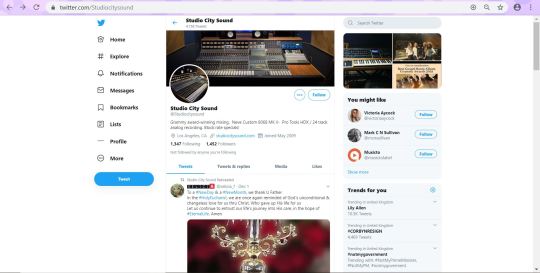
This is an example Twitter case study account I have researched for a company called ‘Studio City Sound’. I wanted to look up example of sound based Twitter accounts to see what sort of content they post, who they are following and what sort of image they send across. When I look at this Twitter account, it is clear to me they post about once a week - on average. They are following a lot of other sound based company - perhaps supporting each other. The content they usually post is of upcoming projects or work they have released and is usually followed by a lot of hashtags, which helps promote their work and posts.
Social Media Research - Sound Twitter accounts https://twitter.com/AbbeyRoad
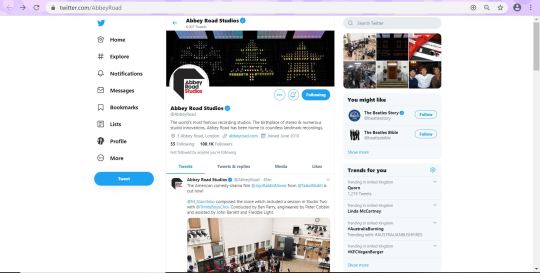
This is another example Twitter account case study I have researched for a company called ‘Abbey Road Studios’. I wanted to research two different Twitter accounts and compare them to see if they are similar or different in promotion, followers and what they post. When I look at this Twitter account it is clear to me they are very professional and successful, they have over 100,000 followers and are only following 55 people, meaning that they don’t need to try and persuade people with followings. The people they do follow seem to be people that work for the company or other big sound based studios. Their posts are also behind the scenes work of what they are currently creating or of work they have released, they don’t seem to use hashtags either which could help them promote their company further.
Social Media Research - Sound LinkedIn accounts https://www.linkedin.com/company/pro-sound-effects/
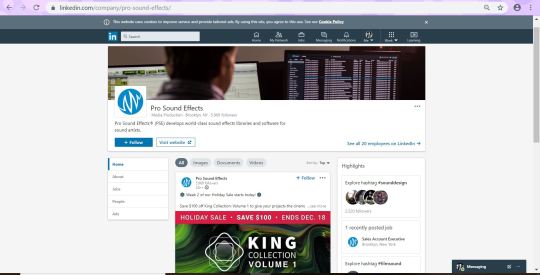
Besides Twitter accounts, I also wanted to research LinkedIn accounts to see how they compare to my account and what they include on their page. The first LinkedIn account I am looking at is ‘Pro Sound Effects’ a company that creates sound effects for software and artists. This page has over 6,000 followers and they seem to post about once or twice a week, when they do post they seem to promote a lot of their work or ‘how to’ posts to do with sound or sound effects. Their website is also linked at the very top of their page - which I also have in my ‘contact info’ at the top of my LinkedIn page.
Social Media Research - Sound LinkedIn accounts https://www.linkedin.com/company/abbey-road-studios/
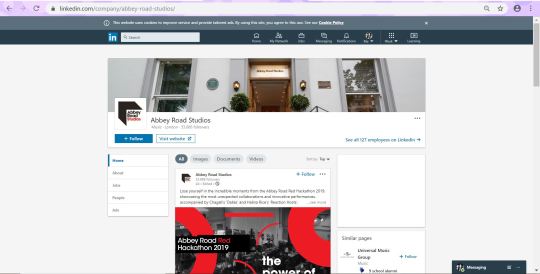
This is the second LinkedIn account I decided to research, this account I am looking at is ‘Abbey Road Studios’, the same company I researched for my Twitter page. This page does not have as many followings as it does on Twitter, but this could be because Twitter is a bigger platform with more people using it. Their LinkedIn page has a post added to it once a week on average and it seems to be of work they have done or achievements. Their website is also linked at the top of their LinkedIn page which is best for promotion.
Twitter: Twitter is a good way for people to expand their audience and grow as a brand or a person through posts and tags that people are interested in. On Twitter, you can add photographs and videos with a short caption and tags to communicate and show off your work. Twitter is a good way to also receive feedback on your work, due to such a large audience.
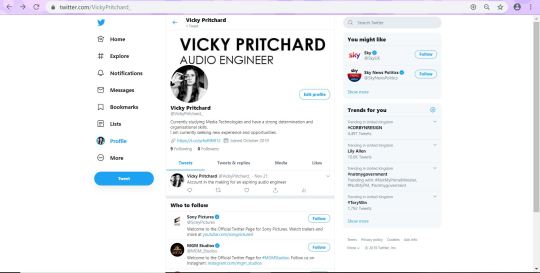
This is the basic set up of my new Twitter account, as you can see it is a work in progress with one tweet, a profile picture and background image added. My background image is my logo and my profile picture is a portrait of me, that has been used in my website and LinkedIn account. I need to add a lot of ‘about me’ information, (my birthday, website, bio and location). Once my account is set up I need to start adding my work to it, the more I post on this account, the more chance I have of connecting to others and increasing my following. I will also need to follow people in the industry I am interested in. I plan to post on this account once or twice a week with previews/clips of my work and text based posts, and once or twice a month with new completed projects. Sound projects are very time consuming so I will have to try and post when I can.
Twitter: This is the link to the final set up for my Twitter account. The account shows my logo, information about me, my bio and contains a link to my website I am currently making. I think that Twitter will be a good way to get honest feedback in my work and connect with others that are interested in the same area of work as me. I plan to follow even more people than I currently am at the moment and keep it updated with new upcoming plans and projects I am working on. By doing this I hope to increase my following and increase the quality of my work.
@VickyPritchard_
LinkedIn: LinkedIn is a good way for people to expand their links in the field they are interested in through ‘connections’ you can find of people with similar interests to you. On LinkedIn, you can add a lot of information about you such as your CV, education, location, occupation, photograph, an about you section and work experience. Which is a good way for employers to find out information about you and are then able to contact you if your profile fits their brief.
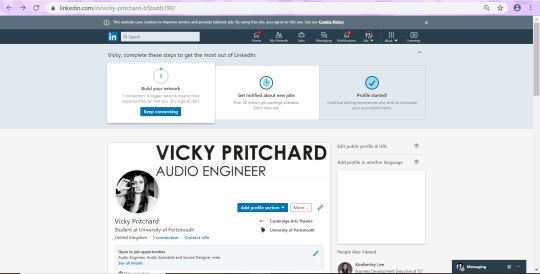
This is the basic set up of my new LinkedIn account, it is a work in progress and as you can see it shows my new email address that I have made for professional use, my name, what University I go to along with my degree and where I live. I need to add my logo, a profile picture and a lot more information about me.
LinkedIn: This is a link to the final set up for my LinkedIn account. It shows my logo, information about me, my interests and desired area of work. I think that LinkedIn will be a good way to connect with people in the area of work I am interested in, I plan to keep it updated with new information and experiences I am learning, hopefully by doing this I will be able to show off my work to others through links, such as my website and Twitter and gain connections with others.
https://www.linkedin.com/in/vicky-pritchard-b5babb190
0 notes
Text
[SketchBook] Draw a mountain reflected in the lake
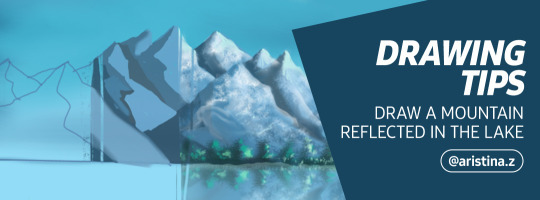

TUTORIAL by @aristina.z Draw a mountain reflected in the lake with SketchBook Hey friends this is aristina.z! I am here to present Part I of my tutorial. From the time I joined PENUP I have learnt so much from each and everyone of you! Have seen your wonderful art and unique styles of art out here...have enjoyed great support and lovely feedback from you all, so this my way to thank you all Pen.ple for being there for me! Difficulty level : pretty easy Style: Most of us have our own style of drawing. And those who haven’t found their style yet but are reading this means they are motivated enough...and will soon be making great art too! I for one am still learning and developing my style and skills.

STEP 1: My first step is choosing a nice color. depends upon my mood, a suggestion, or seeing a striking color even! I thought of choosing blue today!!!! lots of shades...lots of possibilities. Hence the color gives me an idea of what to draw. As I love drawing landscapes I decided to draw a landscape with mountains. TIP ALERT: To get good results do MORE of what makes you happy....it can be doing more of Landscapes, cityscapes or portraits. The trick is to love what you do and do what you love.

Step 2: I browse through several photos and paintings on google of the subject (in this case mountains) I am going to draw. So now there are a lot of reference pictures for inspiration which I can draw digitally in my own style. TIP ALERT: Always try do something with digital art that a photograph CANNOT do ...or traditional art cannot do....so don’t copy a picture just study it :
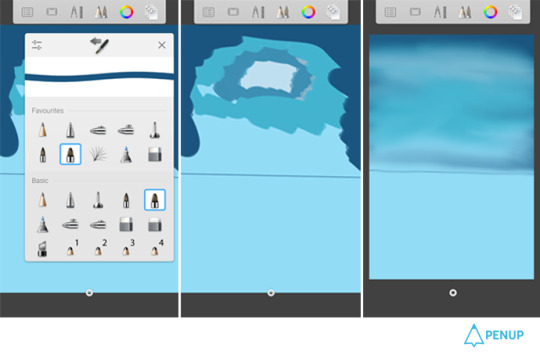
STEP 3: On the first layer divide the canvas into 2 halves and on the upper half use the paint brush to put in several shades of blue for the sky. I will limit the color use to shades of blue here but we can easily use 2 or more different hues. Use smudge to get an evened out appearance. TIP ALERT: Limit color use and blend colors and shades to make landscapes look natural.
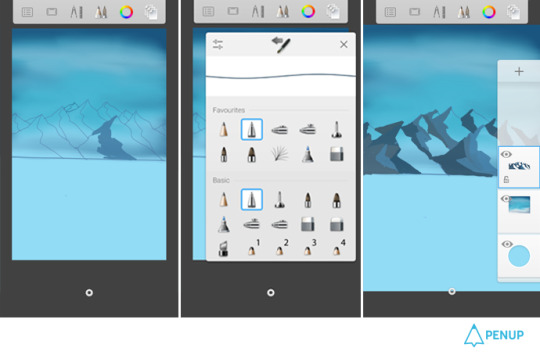
Step 4: On the second layer pen the mountain range on the upper part and color in the dark shades of blue on left half of each mountains. (as though light is coming from the right side) TIP ALERT: keep in mind the direction of light and how it bounces off objects.

Step 5: Add a third layer. On this color the lighter side of the mountains and also add texture by using different brushes. Add some vegetation (shades of blue green) near the base of the mountains. Use the different texture brushes e.g. the crayon brush for the mountains. TIP ALERT: Why use 3 or 4 brushes when you can use more than 80 brushes on sketchbook...try all the brushes. Reset them...explore and experiment to get great texures.

Step 6: Add layer number 4. we can easily do it in 2 layers but its time to get comfortable with more layers! On this layer add snow (greyish white) to the upper half of the mountains with more snow near the mountain peaks and also draw some clouds in the sky.
Add definition to your artwork in this layer if its your final layer.
TIP ALERT: Take one risk(at least)with every new artwork. Try out something new on a different layer so if it goes wrong you can delete the layer without scrapping the whole artwork.
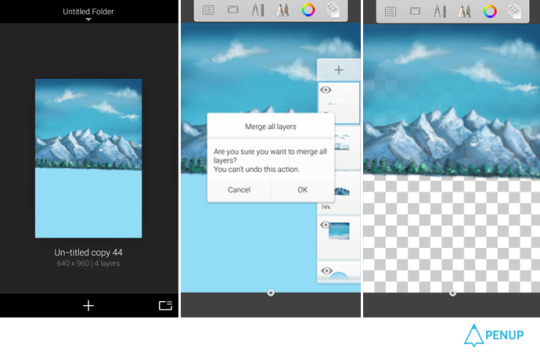
STEP 6: Time to add the reflection. Make a copy (duplicate )of the artwork in the gallery section of your sketchbook. In this duplicate copy use the “merge all” option to merge the layers of the artwork and hide the base color (in this case blue usually its the white layer) TIP ALERT: Always keep the opacity of every layer below 100 (90 -95%)to give your landscape a better finish.
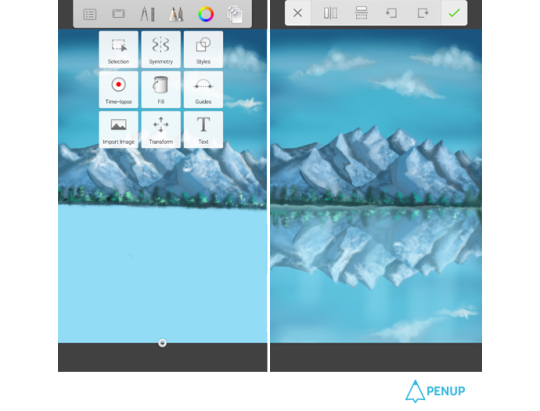
Step 7: Come back to our original artwork with the 4 layers. Use the “import image” option to bring the duplicate layer here and then the “flip vertical “option to get it as a mirror image in the lower part.
The gap between the actual image and reflection should be filled by smudging the edge of the imported image. TIP ALERT: Perseverance, practice and patience are vital. Its easy to abandon an artwork but much more satisfying to finish it.
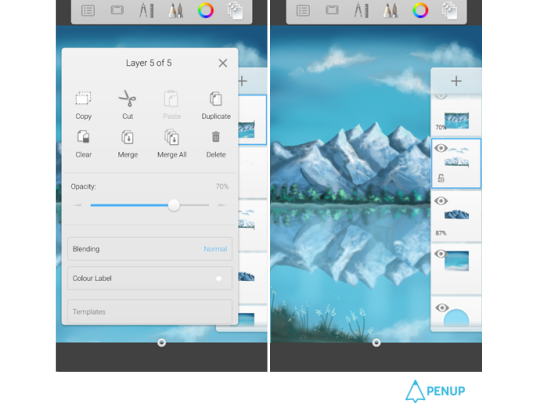
Step 8: This duplicate layer will be the layer number 5. Reduce the opacity of this layer to 70% to make it look like a reflection. Swap the position of the 4th and 5th layer so that the 4th layer becomes the final layer. TIP ALERT: Trust your instincts, if while looking at the artwork at this point (by holding it at a distance) something doesn’t feel right probably it isn’t ...change it...

Step 9: On the new final layer the edge of the lake can be drawn too. Give the final touches to your artwork and don’t forget to give it a nice title! TIP ALERT: Try to give interesting names to your artworks...it helps the viewer to relate better. Step 10: Time to Post it on PENUP! TIP ALERT: And while you are on PENUP don’t forget to appreciate the original artworks of other artists. Your ♡s is the support and encouragement every hardworking artist needs! My first tutorial ends here! You can leave your comments on my fan book page on PENUP. Will be doing a tutorial on light effects next. Just wanted to say that consistency, honest effort and hard work is always rewarded(sooner or later). Like on PENUP where the winners for challenges are NOT always the artworks with popular votes or many reposts but the ones done with honest effort, original and creative ideas. Looking forward to seeing some great art from you all! How was it? We were able to draw the landscape reflected on water in easy and natural manner with drawing features on the app. Even a beginner will be able to draw beautiful landscape just in 10 steps. Also, as what the artist said, the attitude is as important as the skills. Don’t forget that you need consistency, genuine efforts and diligence. Please send thank you notes to @aristina.z who has taught us very useful tips.


Artwork Sharing Social Network, PEN.UP! http://www.penup.com - The PEN.UP Team
0 notes
Text
Nick Church full response
Firstly, how long have you been in the photography industry? I started quite late in life. I got my first camera in 2015, and it went from there. I sold my first photographic prints early in 2015 and that funded some better equipment. My first wedding was late in 2015. I have always had an interest and hobby in art, using pen and inks, so this meant that I already had compositional skills about what makes an appealing image. Also, with a technical and physics background I knew how optics work, how light works and so learning a camera and all the software I needed was quite easy for me. This is not necessary at all as anyone can pick these things up, but it did mean I ramped up very quickly.
How did you transition from a career managing software companies to one specialising in photography? This was tough. If you are going to make it a new career (rather than a sideline) then you need to either 1) have enough capital to fund you while you grow your business or 2) try to grow it in parallel to your current job. I took option 2 as with a young family, large mortgage and other commitments, I could not take the risk of leaving a well-paid job unless I knew it was viable. The techniques and strategy I used to grow my photography business quickly and successfully are now taught to others through my Photography Workshops.
How has your previous career managing companies in the software industry benefitted your practise as a photographer? I think a photographer and a photography business should be the same thing. Many creatives are not as strong on the business side of things, but it’s so important if you want to make a successful career. Remember, you do not need to do this yourself, if its really not your thing, get someone else to do that bit. Do what you do best, outsource the rest. My previous career means that I am able to make strategic decisions around what areas I want to grown to meet market demand. I have systems in place to ensure I can adapt quickly to new opportunities and this too is from my previous career and it’s called being Agile. Agile is a term well used in the software development industry, but has yet to make it in photography. But it’s what I do and means I have a competitive advantage over companies that may not even detect new opportunities, yet alone have the mindset to be able to adapt to take advantage.
How have your artistic talents; specifically architecture and drawing, impacted the way in which you shoot your images? As mentioned above, it meant I was quick to ramp up. With a civil engineering background (actually what I studied at university) I like to use perpective to draw the viewer into the shot. This is especially important with architecture where sometimes you want an immersive experience so that the viewer can really appreciatre the space and how it has been designed and produced within the wider environmental context.
What lead you to decide to specialise in wedding photography specifically? Fundamentally it was financial. 80% of money spent on photography outside of commercial is on weddings. It’s the one genre that most people will use at some point in their lives, and so it was the easiest to get traction in. It is also the genre where lack of photography skills are the least barrier. That sounds bad, I know. But what I mean is that yes to be regarded as among the best you need to be exceptional. But for many couples, especially those on a lower budget or those without appreciation of what photography should look like there is an opportunity to start getting work. Weddings especially need more than photography skills, it’s inter-personal skills, blending in, being professional and pleasant on the day, managing crowds well etc etc. Someone that can do all this really well, but have less skill in photography may still do really well. Portrait photography is the opposite, as all that is important is the portrait. If it looks crap, regardless of how chatty you were, you are unlikely to do well
How much creative control do you have when working to create something specifically catered for individuals? I retain creative control over almost everything. Clients book me because they want what they have seen me do with other weddings, and so most realise the way to get that is to just let me drive things. Sometimes couples have a ‘shot’ in mind that they want or an idea that they would like to expore. This can go one of two ways, it can be either horribly cheesy or awkward in which case I wish I’d been firmer and not done it, or it can take me out of my comfort zone and I’m really pleased we took the ideas on.
Practical elements
What are the processes involved with planning a wedding shoot and to which extent do you involve the client in this practical planning prior to the event? I have a consultation meeting with my clients 2-3 months before the wedding. This is when they will mention any speciflc shots that they want to have and let me know what formal group shots they would like. I will usually then take any ideas they have had and spend an hour or two thinking about how to make this wedding different and create something stunning. Experience of the venue, perhaps a visit, or at least a google-stalk is useful in put to this.
Your use of lighting in a multitude of different venues and locations is really impressive, how do you cope with ever-changing, unpredictable weather conditions and available lighting? Weddings are all about doing ‘your best in all circumstances’. Being good at adapting to conditions not only makes for better shots for your clients, but makes for a much more relaxing shoot. There are wedding photographers that never get over the ‘being sick in the morning’ nerves. This is always caused by the unknowns ahead of them and whether or not they will be able to adapt. In particule if in winter, will it be too dark so that they need to use flash. If you are confident using flash then this is no problem. The light can always be used to your advantage. If there is not much light, then finding pockets of it can create really atmospheric shots, shots much better than you will get with streaming sunshine in August. For those weddings the problem is finding enough shade, so we head into tree cover and look for some shady shafts of light. Always a winner. I am really keen on the Chiaroscuro style of lighting, as used by Rembrandt and co. I think it gives great character to the image and this increasingly defines my style.
Wedding photography often means working with a multitude of different characters with different requirements and specific tastes; what personable skills have you learnt as a result of this? I’ve always been fairly good at adapting to groups of people and fitting in. After a while you get a good sense of who will happily be teased a bit, who you need to be super polite to, who is paying your fee etc etc. This is probably one of the most important bits of the job as no one ever recommends a photographer on their work alone, it’s usually because they were really friendly and nice.
I feel that there must be an enormous amount of pressure on a wedding photographer in having the responsibility to successfully capture such an important day, how do you manage these expectations? Its all about confidence. You can increase your confidence by being 100% trusting of your kit. Dual card slots, dual cameras and extra lenses. You want to make sure that there is no event that you could not cope with (within reason). The other thing is that when your camera becomes an extension of you, then a strange calm comes over you as you know that you will intuitively find the controls you need to get the shot you have in your mind.
The other thing to remember is that most shots you can take twice, even a first kiss in a church you can take again if you cock it up. At a push, confetti can be done again. There are a few bits that can’t so that’s why you over shoot heavily to make sure you get something. Also, the clients do not know what shots you have in your camera (which may not be useable) and they do not know what you had in your mind. Most shots they wlll love, even if its not what you really wanted to deliver. Take any lessons learned to the next gig.
do you hire a retoucher/editor for post-processing? If so, how much creative control do you have over the final result? Yes, since summer last year I started using an editor. It saves me so much time that I wish I had done it before. Initially you provide your lightroom presets and so the tones are correct, and for the first few shoots you give a bit of feedback so they can re-work things. But after a while a good editor will simply start sending galleriesr that look like yours. And in any case, any differences are very small, your clients will never notice. We are our biggest critics. Outsourcing editing is a good example of working out where your efforts are best placed. I suddenly realised one day that I was spending 20 hours on an edit (3 days) and actually, I could outsource it, the client would never know the difference and I could spend all that time working more interesting and valuable things. For me, this was how I grew Nick Church Photography Education to train other photographers.
Is there a specific balance between candid/staged photographs you aim to achieve at every wedding or does it depend on the client? Some clients are more relaxed than others, and some actually request that most shots are documentary style. I do a combination of posed/natural shots. So I put the couple in some nice light and let them interact naturally so that the connections between them come out. Then I get back and take the shot so that I’m not interfering with those emotions at all. This makes photos feel real.
I noticed Nick Church photography offers both photographs and film packages, how do you allocate your time both shooting film and images? That’s easy, my Son who studies film at Ravensbourne Uni in London shoots my wedding films. We have a similar style and so the two compliment each other well. I do not market the wedding films, rather just offer them as an add-on. The reason for this is that I worry that clients might think that the more services I can offer the less expertise I’ll bring to both. Ie. The jack of all trades, master of none principle. I might change this view in the future, but I want to be known as a photographer first and foremost.
Which camera/lenses/flashes do you use?
I use Sony cameras, 2 x A7Riii. I have a range of lenses. For most the day I have a Sony GM 70-200 f/2.8 on one camera and a Sigma ART 35mm f/1.4 on the other. Later on I might swap to my Zeiss 85mm f1.8 when light starts to fade, or I might move to a wide 18mm for dancefloor shots. Depends on how I want to convey the atmosphere. Like many wedding photographers I use Godox v860ii flashes. These are amazing things that allow you to trigger any of the others from the flash using a radio link. It’s a really versatile way to get the lighting you need on a wedding day when setup times are short.
How many meetings with the clients occur prior to the actual shoot day? Usually just the one. Sometimes two, sometimes none. But usually one. Some couples want to meet before they book which is fine if it’s not too far away, or if they are happy to come to my studio. I’m thankfully past the point of driving all over the place to chase bookings and then have then choose someone else.
What are three essential parts of your photography kit you are never without whilst shooting? 70-200mm lens. Don’t really care about the camera system/brand as long as I can have this I also always have a spare battery, SD card and a cleaning cloth. With those things I can pretty much shoot a whole wedding if I had to. If I travel on a plane, these are the things I keep in my hand luggage for that reason!
How much do you charge for a deposit vs the full price to hire you for a day? I always specify it as a booking fee rather than a deposit. There is a legal advantage to this, as a deposit can be requested back if it goes to court. A booking fee though is to pay for your time and systems to take the booking so easier to argue that they cannot have it back if they ever cancel. I charge a 20% booking fee in almost all cases. It’s high enough that they won’t want to lose it (by cancelling or going with someone else), but low enough that it’s not too much of a barrier to booking me.
Please tell me a valuable mistake you made when you first started shooting weddings, how have you learnt from this? I think my mistake was to not have the systems in place that I needed. This is always a problem, because when you are starting out a google spreadsheet and a calendar are enough. But then during a conference call with my ‘day job’, I had a sms from a client saying simply ‘Hi Nick, we’re at the venue, are you on your way?’. I went pale, felt sick and thought I might have a heart attack as it sounded like something had slipped between the cracks and I’d forgotten a wedding. I looked up the person’s name, found the email,s and discovered that I had actually just missed the wedding meeting at the venue. Still bad, but not something I’ll get sued over.
This made me immediately invest in a studio management system. This is a package that manager contacts, shoots, invoices, contracts and diary. It is now my second brain. I should have had one from the start as if you are organised you come across as professional.
do you have liability insurance? Yes, always, and make sure my clients know it.
how do you manage your pay x time if the event lasts longer than expected? With weddings, referrals are a big part of your marketing strategy. So it’s tough because if a wedding runs over and you need to stay longer, you don’t want your last face-to-face interaction to be you saying you are leaving or they need to pay more. To cope wth this I often ask people during the consultation meeting what should happen in this event. Then I stay longer but retain the option to invoice later for the extra hours. To be honest, the reason I stay later is usually to capture some fireworks and so who is going to complain too much about that, so I often do not bother invoicing. Again, it would mean that our last interaction would be ‘thanks for letting me see the fireworks and have some more food, here is an invoice for my time… “
do you charge a travel fee and what does that cover? As above, I put in my contract that I may charge for travel at 45p per mile. If it’s under 50 miles I tend not to bother, but if it’s in Cornwall, I would be out of pocket otherwise. But it’s case-by-case. IF I think saying that travel will be free will get me the booking, then I’ll offer it.
What is provided as part of Nick Church photography’s service? How many pictures will be taken and how many does the client get to choose for an album? I usually will take around 4000 images on a wedding day. After culling (choosing the images to deliver) this ends up with the client getting between 500-700. If they have ordered an albm, they can choose 40 initially. This is set steatefically to sound like plenty, but not enough in practice, so they often need to buy extra pages.
- how many are then edited and sent as final images?
do you offer your clients digital negatives or unlimited downloads? I will never send a raw image out, and this is the general case for all photographers. I have found that any clients asking for raws do not understand what they actually want. They are usually talking about very high quality formats, so TIF is an option as this is raw-like in quality, but still contains the edit.
I tell my clients that they are unable to share the full-resolution digital images. Naturally, there is no way to administer this but I think most adhere. The reason for this is that I have an online store which they CAN share to family and friends, and I get a small revenue from prints that way. This revenue would be zero if people could get free images.
How many team members are present at a wedding shoot? Often it’s just me, but sometimes I will have an assistant. The assistant could be someone that is keen to learn, someone that I am training to shoot weddings on their own (for Nick Church Photography). Sometimes there is a second shooter and a film-maker also.
How do you manage finances considering you are freelance? Al invoicing is managed from my Studio Management System. This means that payment of a booking fee will send a receipt and confirm the shoot, blocking my time out on in the calendar etc. In terms of accounts I used to do this myself, and submit my returns to HMRC, but it took me about 7 days total effort every time. I have since had to register for VAT which means returns every quarter so I now have an accountant and use Quickbooks to manage everything. Yes, there is expense attached to it, but to be honest, it’s much cheaper than 7 days of my time
Branding/team
How many people work for your company and are a part of Nick Church Photography? I have no direct employees, but have 6 sub-contractors that I employ as needed for shoots, video, editing etc. Nick Church Photography has become a collective of photographers that I aim to give the same experience as if I was shooting myself. This is a really useful model.
How did you navigate branding yourself in such an oversaturated industry where there is a lot of competition? You have to offer something different. For creative industries that means just don’t be the same as everyone else. The more style you have in your images that defines you the better as people will see it, want it, and pay more for it. If everyone is the same the ONLY thing you can compete on is price.
What would you say is Nick Church Photography’s USP? I am passionate about delivering images that take people’s breath away – something for them to put on the wall, not in the back of a cupboard. I also want to do this with a service level that is above the normal
How have your features in magazines such as ‘your Bristol and Somerset wedding’ and a multitude of podcasts benefited your company in terms of exposure to a greater variety of clients? I would say that your example is one that has NOT been very useful. I don’t think brides shot for wedding suppliers by magazines these days, so it is something that I will not be too bothered chasing in future. However, podcasts and professional photography magazines are a different story. These give you a known name in the industry. It’s not something that is directly marketable to photography clients, but it is something I am now using for my workshops. Many of my attendees of classes first heard me on a podcast.
I have also created a Facebook Group called Nick Church Photography Collective. This is a space for supportive, collaborative photographers to learn, talk and share work together and it’s a really good place to hang out. You are welcome to join.
How have you insured that the branding of Nick Church Photography (specifically your website) branding has represented your company? My branding is aimed to be elegant, and identifiable but straightforward. I think that represents me as a person too. Logo etc is very simple, partly this is because it means it is less likely to date, but also without a branding expert I had to do it myself! 😊
0 notes
Text
What’s the Most Important Lesson You’ve Learned Along Your Journey?
Every twist in our story, challenge we face, and obstacle we overcome is an important part of our story. These difficulties make us stronger and wiser and prepare us for what’s ahead. As we grow and succeed we may imagine that soon the challenges will fade away, but in our conversations with business owners, artists, creatives, academics, and others we have learned that the most common experience is that challenges never go away – instead they get more complex as we grow and succeed. Our ability to to thrive therefore depends heavily on our ability to learn from our experiences and so we are asking some of the city’s best and brightest: What’s the most important lesson you’ve learned along your journey?
Jantae Jackson | Marketing Specialist
What I have learned is that there is no room for fear in business. You have to overcome it to succeed 💛.
@MorphMarketing [email protected]
Kennedy Dendy | Broadcast Journalism Student/CBS News Intern
The most important lesson I’ve learned in my journey stems from a piece of advice that my mother gave me many years ago. “If you want something, go get it.” I have truly learned the importance of chasing after my dreams and passions, despite what the world may throw. I learned to have a “go-getter” mindset when it comes to what I want for my life. It is important to understand that nothing is going to be simply handed to you. Getting to the place you wish to be requires a great deal of dedication, diligence and discipline. Twists and turns may come your way, but you must fix your eyes on the end goal.
@kennedy_dendy KennedyDendy.com
DJ SEAN ANTHONY | DJ | ENTERTAINER
It would have to be to trust myself and my creative sound. Someone is always going to critique your work or offer feedback that you could’ve done without. In my beginning stages that would eat me up. I would work so hard on trying to accommodate that one person that said enough to cause this displacement in my style. That I would literally drive myself crazy until I got it right. But now I’m so much better than that. I’ve managed to accept that my style of DJ’ing is different and that’s what makes me stand out.
@djsean.anthony
B. Whitcomb | Travel Advisor for Travel with B (Travel Services)
I’m new to Dallas, I recently relocated from Omaha, Nebraska. I have a passion for traveling, so I figured why not do what you love?! It’s my goal to make travel affordable for everyone regardless who they are or what they do. I graduated from the University of Nebraska at Omaha as a dual major in Psychology and Communication. There I focused on mental health and leadership. Self-care is so important on the journey! The road to success is hard but its supposed to be…or everyone would be traveling in the same lane. The most important thing I’ve learned is to trust the process. You must learn from your mistakes, do everything with a purpose and prioritize God in your life. There is no wrong route to one’s destiny, but various roads one could take on their journey. Just remember why you started and never give up!
@travelwithb2day
Brotha Jah | Founder of YAH LIFE Inc.
YAH LIFE Inc.
Always keep The Most High first and stay true to who you are.
youtube.com/channel/UCRUGwYbtkQ8IUiR5o35V2sw teespring.com/stores/yah-life-inc?page=1 amazon.com/Brotha-Jah/e/B07RJZC8DK?ref_=dbs_p_pbk_r00_abau_000000 @YAHLIFEInc facebook.com/profile.php?id=100015420184568 @yahlifeinc
Cesar Huesca | session guitarist | solo artist from Mexico
@alvarrockgarcia_fotografia
Well, my main lesson on my musical journey conveys to a life lesson which is not judging anyone’s path since we all have different processes throughout existence. We should understand that we live in the same place and we need to take care of our minds, bodies, spirits and emotions, and art is a great way to develop such things to higher levels. Music can be healing in many ways and we must be able to look through the eyes of spirit, calmly and no hurried, one step at a time, with love to everyone and everything.
youtube.com/user/CesarHuescaMusic @huescaguitar
Gabi Kelley | Mom | Writer & Personal Development Coach
God is always good, and we are all created for a purpose!
@gabiruth
Max | a seasoned professional Urban Glamour | Fitness | Cosplay and Event Photographer in the DFW area
Portrait photography must be greater than the sum of its parts. Careful planning, preparation and the ability to adapt to ever changing conditions in near real-time are critical to a successful photo shoot on location. Guiding and communicating with your client is essential. Event photography, on the other hand, is about timing and story telling. Find a story to tell and wait for the perfect millisecond to capture it.
@themeshootspage
Sammi Luna| Health & Wellness Coach
The most important lesson I have learned in my journey so far is that it’s not just about working out your body, it’s 100% completely also about working out your mind. Personal development and mind growth have been a side effect I didn’t know I would have but definitely something I needed! When you start your journey to weight loss and getting healthy, you’re not thinking about anything else but losing the weight. Losing the pounds and the inches and gaining the muscles. You don’t think about the mental toll it will take on you. All your interested in is losing, but my oh my did I gain so much more! Mental health, personal health, and mind growth are just as important as losing the weight. And that has been the best and most important lesson I have learned so far. Every morning I start it off with personal development, set the tone for the day! It really is the only way to start every single day, to live it to the fullest!
@sammi_getsfit Sammiluna.goherbalife.com
Nathan Clark | Founder: Health & Wellness CBD (H&W CBD)
The most important lesson I have learned in my journey so far is to never doubt yourself. Starting something you truly believe in can be difficult and when you feel like quitting you just have to think about why you started in the first place. I started H&W to help people through similar struggles that I have experienced myself, because I know first hand what it feels like to be in pain.
Creating H&W has been a dream of mine after I experienced how much CBD helped me recover and regulates my pain after a motorcycle wreck back in 2012. It is now my job to reach out to people in need and provide them the purest pharmaceutical grade CBD products on the market. For more information about myself and my company you can visit the about us tab on the website.
hw-cbd.com @hwcbd @hwcbdoil
Aviisway | Creative Director & Filmmaker
The most important thing that I have learned along my journey is that we are all destined to fulfill our desires and everybody should be equally loved and supported. I feel connected to the thrill of life, and being able to capture those moments on a device and share it with the world allows me to tell a story that can’t be explained in words.
@aviisway_ youtube.com/channel/UCy_5KwDj_AX0hTUDrYLyNTg
Brigitte Buckholtz VerHagen | founder of EastsideGems
What is the most important lesson you’ve learned in your journey so far? To celebrate the small achievements, while setting goals for the future. As a momtrepreneur, I have to balance my family and business life and during time of growth that can be difficult. I started with only $200 and continued to reinvest the money into the company so I could obviously grow and offer my followers nicer pieces and sometimes more rare mid century modern designed furniture. And it really took off! We’re primarily an Insta shop, people can come view any item by appointment but we don’t have a retail space or showroom just yet. With the growth we’ve had that can be frustrating! But when I look back to 6 months ago when the company began and see how far we’ve come, I just want to jump with joy! We’ve surpassed all our goals already and those small achievements are BIG! We have future goals and plans in the works but the biggest lesson was to just celebrate how far we’ve come! It’s been a fun ride.
@EastsideGems
Samantha Johnson | Feel Good Artist & Mom
In this journey of, my so far, young life, I have become a mother, but I was an artist first, it was my first baby. In this industry your style is not necessarily everyone else’s style; your feelings, your inspirations. I could spend two minutes on a piece of art and someone think it’s amazing, whereas I may see disappointment. Or I could spend a week on a project and see greatness, where somebody else might see and feel nothing. It’s all about your own journey, your own love, your own aspirations/inspirations, we’re not here to please everyone. And though that will always be understood, making it a reality is different. We like to please others, we want them to see what we see, and that’s life in most aspects. There’s beauty and pride to be had, when you grow and become less worried about everyone else; what they think/have and what you don’t. Instead you invest more in yourself and your craft, no matter what that may be. How I see it…there’s art to be seen in almost everything, and that is what I live by. Art is love, its happiness, hope, and it doesn’t always have to be something you can physically touch. It’s a feeling. And for me, if I can give someone a feeling, something unexplainable, yet so pleasant through my work or personality, I’ve accomplished way more than just a small piece of green paper.
artssoulpurpose.com @ArtsSoulPurpose @isthatsammiej
Ryan Wilson | Founder | Lead Photographer of RAW Photography
The most important lesson I have learned in my journey is that everyone’s path is different. I can pay close attention to the road chosen by others and how they handle certain situations, but at the end of the day God has already chosen my path for me. I have to trust that God has already equipped me with everything I need and know that he wouldn’t put anything before me that I can’t handle.
ryanallenwilson.com @ryanallenwilson
Bo Priest | Key Accounts Manager at Purus Labs
If you want your business to grow, you can’t be too good to do the little things.
@puruslabs @puruslabs Youtube.com/puruslabsvids
Zach Harris | Producer at RocketBrand
@gorocketbrand
The most important lesson I have learned in my journey so far is that if something can go wrong, it will go wrong; it’s all about how you respond that defines the difference between success and failure.
@harriszach
Neha Bhargava | Blogger | Writer and Digital Marketing Strategist
Finish what you start and start what you believe you can finish. I believe in weighing my options even before I start making decisions. You just can’t bite more than you can chew. There is no redo in life. Whatever decisions you make today, you will be living with them tomorrow.
I have learned to believe that giving up is not an option.
Relationships, marriage, kids, career, business, you jump in with a mission to be successful. Focus all your energy on it. Believe in it. Fight for it. Like there exists no other way. No other way to look at. There is just one thing to do- work hard towards it, finish what you started, and you will be surprised at the contentment you feel with the outcome. I have noticed that when I put everything into achieving my goals, I walk with no regrets. And that is exactly the future I want to live in.
thebeautifulmama.com @the.momhood.tales @The-Beautiful-Mama
Renae Owens | Founder of The Millennial Market & I Am Still Human
The most important lesson I’ve learned in my journey so far is you can’t run a business without consistency & connections. Those are the main keys of success! Without consistency nobody will believe you & how serious your are in business. You won’t be able to grow and connect with your target audience without consistency. Personal connections & engagement with your audience and even your competitors will allow your brand to go farther than you can imagine!
Millennialmkt.com @The.millennial.market @Iam.still.human
Nadia Massey | Dallas Makeup Artist
topshopculture
The most important lesson I’ve learned through out my journey so far… quality is definitely more important than quantity, and consistency is key to all accomplishments. Successful people do consistently what everyone else does occasionally.
Ariel Hayes | Biology Major | HBCU Cheerleader
I’ve learned that God is the only person you have at the end of the day. That’s one person you can vent to that will actually listen and forever be by your side. No matter what you go through God is the only person that will be able to turn things around. Without him I’m nothing. God is a daily medicine and if you don’t seek him it’s hard to keep going.
@WeKnowShe_Ariel youtube.com/channel/UCyF_Iace26MOEgz2iA0MPNA?view_as=subscriber
Ramon Medina | Personal Trainer & Donut Enthusiast
I’ve learned that every experience, good or bad, is a chance to learn and grow. The best trainers in the industry are the trainers that are always willing to learn more, whether that be different movement styles, training techniques, or from life mistakes. Fitness is always progressing and when you box yourself in, you miss out on the opportunity to give your clients a well rounded transformation. Stay open to change, stay open to suggestions, be willing to be part of a team, and always be willing to trust and learn from those around you.
@bodyxramon
Arianna Klaus | sustainable fashion enthusiast & creative
Most important lesson so far: don’t let fear/perfectionism get in the way of creating and doing what you love! We can go our whole lives with the self-imposed limitations and never start anything because we think it’s not good enough or that it won’t work. Freeing your perspective from those thoughts frees YOU to live fully and more abundantly.
youtube.com/therecreative
Janie Lovvorn | Mom | Blogger & Photographer
The most important lesson I’ve learned is to never underestimate the peace that comes when we put our faith and trust in Jesus Christ. No matter what we face in life, there is hope knowing that the creator of it all loves us unconditionally and has a plan for you and me. This relationship continues to encourage me daily in so many ways – not to worry, to live a life of gratitude and to love as Jesus loved.
Joshua Graphk Argee | Recording artist
I’ve learned over time to put nothing over God and Family.
youtube.com/user/Goondox916
Kandrea Kincaid | beauty influencer
The most important lesson I’ve learned is that no one path is the same. Everyone’s journey is different. It won’t happen for you, the same way it happened for someone else. What’s for you, IS FOR YOU!
@_kaye.slay
Jarren Avery | Artist & Entrepreneur
The most important lesson I’ve learned so far is patience! You must have patience with yourself, the process; and most importantly, others. Fall in love with the journey and the destination doesn’t seem as far.
linktr.ee/jarrenavery @jarrenavery
Avis Clewis | Personal Stylist
The most important lesson I’ve learned on my journey is that you have to be your own support system. You have to genuinely believe in yourself first, before expecting anyone else to.
@therealavis youtu.be/CZ3mGtYUCdm
Kendrick and Dairon Houston of The Sole Proprietorz | YouTube content creators and sneaker connoisseurs
Our most important lesson would be to trust the process. It isn’t easy to trust the happenings and events of life when nothing is in our favor, and it isn’t easy to be optimistic about it. But that’s where our toughness and resilience is being tested. People who don’t trust the process of their lives cannot expect to excel. With persistence and hard work dreams can become a reality.
youtube.com/TheSoleProprietorz @TheSoleProprietorz
Allyson Nick | Creator of Mommy’s Making Moves and Release Coach
@bitmevents
The biggest thing I have learned while on this journey of starting my business, is that everything is in God’s control. Sometimes we don’t feel capable or worthy of the gifts God gave us but He gave us those gifts because He knows we are capable of using them to a larger capacity. Keep your faith and God as the head of your life and business. Also, mom friends, we have to have time to relax! If you are running on fumes then what are you serving your family? There are different levels of release but the biggest is time to yourself for 20 minutes at least 4 times a week.
@mommysmakingmoves @mommysmakingmove
The post What’s the Most Important Lesson You’ve Learned Along Your Journey? appeared first on Voyage Dallas Magazine | Dallas City Guide.
source http://voyagedallas.com/2019/07/24/whats-important-lesson-youve-learned-along-journey/
0 notes
Text
Sony interview: 'Our focus is to increase the overall market'
On a recent trip to Thailand to visit Sony's Chonburi factory, where all Sony ILC cameras and lenses are assembled, our tech editor Rishi Sanyal had the honor of sitting down with Kenji Tanaka, who is head of interchangeable lens cameras globally. Also joining the discussion was Daisuke Goh, product manager at Sony, and Matt Parnell, senior marketing communications manager at Sony.
Kenji Tanaka, Senior General Manager, Business Unit 1, Digital Imaging Group, Imaging Products and Solutions Sector. Photo: Rishi Sanyal
We discussed a number of topics, ranging from Sony's intent to stimulate the market overall as opposed to segmenting it or supplanting any one manufacturer, to future sensor developments we can expect, to the role of computational photography and the internet in future cameras. It was an impressively open and honest discussion, and we thank everyone involved for the opportunity.
Please note that this interview has been edited for clarity and flow.
Thank you so much for this opportunity, Tanaka-san. Your recent market share data is quite impressive. What do you see as your widest user base, and what is your biggest target group?
Kenji Tanaka: Our biggest focus is to increase the [existing] market, not to segment it. The overall market is decreasing, and it's been a challenge to increase the market, overall. We believe we can do so by targeting professionals and enthusiasts.
'Our biggest focus is to increase the market, not segment it.'
Amongst professionals and enthusiasts, who do you feel you still need to attract to your products?
KT: There are many types of professionals. Our target for the a7R II are landscape and portrait shooters. The a7S II has been adopted by many professional videographers. Right now we are already reaching these professionals successfully. But as of last year (2016), our products have gained significant capability in terms of speed. Therefore, we would like to target sports shooters and photojournalists by continually improving the speed, performance and usability of our products.
What about wedding and events shooters?
KT: Yes, these professionals have been adopting our products as well, and they've particularly appreciated Eye AF and the resolution of our products. However, they require more durability. We are actively working to address their needs.
Matt Parnell: In particular, one piece of feedback we frequently get from all of our wedding photographers is that the low light performance of our products has changed the way they can shoot events.
KT: And wedding videographers particularly in Asian countries have invested in our products.
Technologies like Eye AF depend upon close integration between the imaging sensor, processing pipeline and AF algorithms programmed into the camera. Sony's close integration between the image sensor and camera divisions allow for quick iteration on such technologies. As photographers, we win: the compositional freedom Eye AF-C affords me for (unpredictable) newborn photography is unparalleled. Even with the pocketable RX100 V. Photo: Rishi Sanyal
Which camera do your users gravitate toward in particular for autofocus capability?
KT: Professionals largely use the a7R II for autofocus ability. a7S II for video.
The form factor of an a7S II and FS7 are very different. Do you see a convergence of these products and, if not, how will you target these user bases separately?
MP: We see many professionals and documentarians that use both the FS7 and a7S II to complement one another. A and B cameras, for example.
Daisuke Goh: But they are very different in terms of ergonomics and features, with Raw recording and high-frame rate being core technologies of the FS7. Those who need these gradually step up to the FS7, often from the a7S II.
You've stated your intention to re-stimulate this declining market via innovation. How do you think your competitors should do the same?
KT: I can't comment on other companies, but I can explain our position. The most important thing is the image sensor. As you know well, every camera function is related to the image sensor. For example, the AF sensor and exposure sensor are all based off the image sensor. So the image sensor is key, and we develop it in-house. This means we can customize our future products with more intention [by having our camera and sensor development teams working together]. This is a differentiator compared to our competitors.
'Every camera function is related to the image sensor... [which] we develop in-house. This means we can customize our future products with more intention.'
Speaking of sensors, are you interested in lowering ISO sensitivities? Particularly by increasing full-well capacities of pixels to increase dynamic range and achievable signal:noise ratios (a la Nikon D810)? I think many landscape and current medium format shooters would be interested in this.
KT: Both high and low ISO sensitivities are important. In case of low sensitivities, we are working on increasing saturation capacities, or well depth, of pixels. In case of high sensitivities, pixel size matters.
The future is certainly bright for Sony, and photography in general. One thing I'd love to see is extended (lower) base ISO dynamic range via higher saturation capacities of pixels, a la the Nikon D810 at ISO 64. While this a7R II certainly did the job perfectly well capturing this high dynamic range scene on my recent trip to Iceland, a lower base ISO that would have allowed me to give the sensor even more exposure before clipping the highlights to the left, yielding an even cleaner image. Technically speaking, an image with higher overall signal:noise ratio - the reason people love medium format images. It's great to hear that Sony's sensor division is fully aware of this need for lower, not just higher, sensitivities. Photo: Rishi Sanyal
But your a7R II, which has very similar low light stills performance to the a7S II, suggests otherwise. Could you elaborate?
KT: Think about 8K video. To get that sort of resolution on a sensor, you need larger sensors, otherwise pixel sizes are too small. To get 8K from a micro four thirds sensor, for example, the sizes of the pixels have to be very small, around 2.3 microns. I think larger sensors are important to maintain image quality as we go to higher resolution video and stills.
Right, it's more sensor size that is key.
KT: Yes, this is why we choose to concentrate on full-frame.
Is 8K video something you're already working on?
KT: We can't comment on future product plans; however, we can confirm that we are paying close attention to all trends in the video marketplace, including 8K.
And you already have products that are sampling 6K: the a6500 oversamples its 4K footage by 2.4-fold yielding extremely crisp footage. Meanwhile we have some professional videographers intent on using high-end pro- 6K and 8K products to get oversampled 4K; yet you offer it in a consumer product. I find that interesting.
KT: Yes, we already have 6K sampling.
Are you also focusing on global shutter?
KT: Yes, that is one technique to remove rolling shutter artifacts. However, there are other choices to remove this artifact, like a mechanical shutter.
Increasingly we're seeing computational approaches to get better imaging performance from limited hardware.1 When do you feel computational technologies attempting to simulate the effects of larger sensors and optics will truly challenge more traditional approaches?
KT: These approaches work in some occasions, but it's hard to realize for all scenarios. And a lot of the computational products I've seen so far need very large, fixed F-number primes [Editor's note: presumably to compensate for smaller sensor sizes].
Are you trying to build in any computational approaches into your current cameras today?
KT: No. But speaking of light field, of course we are studying it. But not at a production level.
Do you think that as megapixel counts get higher and higher, it would make sense to devote some of those pixels to light field?
KT: There's currently too much of a resolution cost. You need to devote at least a 5x5 pixel array just for one output pixel.
Do you benchmark against competitor products when developing your own products?
KT: Of course. We benchmark against the best product for any use-case. We learn from other companies. We must, because we are still beginners. The challengers.
Daisuke Goh, Manager, Product Planning & Business Management, Digital Imaging. Goh-san was product planner on the a7R II, and is pictured here looking out upon the Gulf of Thailand at moonrise during a recent trip to Sony's Chonburi factory. To say the least, talking directly to these brilliant engineers was a unique opportunity to relay our, and our readers', feedback for future iterations of Sony products. Photo: Rishi Sanyal
The convenience of the smartphone is a challenge to cameras. I'll often see friends pick up their smartphone2 instead of the ILC sitting in front of them to snap a photo of their child. What is Sony doing to help the parent, the hobbyist get assets off the camera and into a library accessible from all devices?
KT: We have apps like PlayMemories to make things easier for smartphone users. In the future, we cannot avoid making this process even easier via better integration with internet/cloud services. This is a big topic of discussion and something we are investing in. One issue with direct communication from camera to internet services is that regulation, not technical, issues make this difficult. Everyone already has a smartphone, so we want to use the smartphone.
One thing Sony can't be blamed for is a lack of caring when it comes to quality. From Betamax to Blu-Ray to LCOS displays, how do you maintain a culture of insistence on quality and innovation across such a large company?
KT: For me, Sony's founders are incredibly important. They are no longer alive, but the founders' spirits and will are alive and well.
DG: Have you had a chance to read the founders' spirits? It's written. It basically says: 'Always have a playful mind, and do something that others don't do.' This is basically in our blood.
'Always have a playful mind, and do something that others don't do.' This is basically in our blood.
That's a great philosophy. Thank you for your time!
KT, DG, MP: Thank you!
Editor's Note:
We nab every opportunity we can get to sit down with engineers at camera companies, and are particularly honored when we get a chance to speak with executives like Tanaka-san, who is head of Interchangeable lens (ILC) products globally, and Daisuke Goh, who was product planner on arguably one of the most exciting cameras we’ve seen in recent times: the a7R II.
Recent data over a two month span show Sony to have pulled ahead from #3 to #2 in full-frame ILC market share, based on revenue. Sony stresses this was no easy task, in particular given the shortages it recently experienced in delivering one of its most popular – and most revenue-generating thanks to its price – products due to the earthquake: the a7R II. It was interesting to hear Sony’s response to this (for them) exciting news: Tanaka-san stressed that the overall goal of Sony Digital Imaging products is to grow the (now declining) market, not segment it or pull ahead at the cost of its competitors. Sony believes it can do so through innovation, which should spur the expansion of the hobbyist segment. By offering imaging experiences and quality far above and beyond what is capable with smartphones, Sony hopes to rekindle interest in cameras and dedicated imaging products.
Given their focus on quality, it’s not surprising that Sony is pouring so much effort into their full frame products. It was only a little over 3 years ago that Sony launched the world’s first full frame mirrorless system, just a short year after launching the world's first full frame camcorder (NEX-VG900). Since then, Sony has seen a remarkable adoption rate: they claim they are #1 in 4K camcorder sales, and hold over 80% of the mirrorless market share in North America. The largest adoption of full frame products has been in China and the US, and Sony’s projections estimate an additional growth of 30% in the full frame market. While some may argue that is optimistic, Sony cites the general market increase with the release of the Alpha 7R II, showing that innovation drives growth.
And Sony is particularly innovating in the image sensor sector, where they claim they are investing more than most. It’s interesting to note that the smartphone industry – the very one threatening dedicated imaging products – itself helps Sony, since Sony is a major supplier of smartphone camera sensors. So when it comes to image sensors, Sony’s return on investment is multi-fold: technologies like 3-layer stacked CMOS for smartphone cameras that allow 4x faster readout speeds than conventional chips for minimal rolling shutter and 1000 fps video capture will not only make our smartphones better, but will also trickle into ILC products and allow Sony to re-invest resulting earnings in even more exciting sensor technologies. It's not just Sony that benefits from this - like smartphone manufacturers, other camera manufacturers also benefit from Sony sensor advances. What Sony has to offer though, as stressed by Tanaka-san, is the ability to work closely with the sensor team to develop better products and features around the strengths of those sensor developments. Autofocus and subject recognition improvements, for example.
youtube
Technologies like incredibly intelligent AF in 4K video with no hunting, or 24 fps Raw stills capture to nail the decisive moment (shown above), not only help professionals and enthusiasts, but arguably kindle the inner spark of us all to capture the memorable moments of our lives. Sony believes that focusing on innovation will bring more people back into photography and videography.
Sony’s approach certainly appears sound: exciting technologies offering new imaging experiences spark the curiosity of not only enthusiasts and hobbyists, but professionals looking to differentiate their work as well. And many others as well: documenting the fleeting moments of our lives is arguably a very human interest. Devices that allow us to do so more easily, more readily, and in higher quality are certain to appeal even to the amateur mother or father capturing the irreplaceable moments of their little ones’ lives. With the iteration we’ve seen in Sony ILCs and premium compacts in just the last 3 years, it’s no surprise that Sony aims to be the #1 premium imaging company. And we will all benefit from its relentless drive.
Footnotes:
1Lytro for example. More recent approaches include the Light L16, which combines lenses of multiple focal lengths to achieve high-res imagery and a large zoom range. The Google Pixel smartphone uses multi-imaging techniques to get impressive image quality out of a small sensor. iPhone 7 uses two lenses to create a depth map to simulate shallow depth-of-field. Computational approaches of recent are seriously challenging traditional cameras for general users that aren't too too attentive to the outcome.
2Largely because of the ease of backup, curation, and sharing to services like Google/Apple Photos and Facebook.
from DIYS http://ift.tt/2oHTr8W
0 notes
Text
Research Report
This should be a summary of and a critical reflection on your research process so far. You should try to give the reader a sense of the process you have been through - your journey, your thoughts and decisions along the way and what has informed the choices you’ve made. Try to be as honest and as critically reflective as you can.
Please extend boxes as required (length 1000-2000 wds)
Name: Elif Abacı
Major Project Title
(Or working title - how and why did this title develop?)
Every Child Smiles In The Same Language is the working title of my project. In this project I am focusing on the children who needs help in my hometown Istanbul/Turkey. There are many children in different nationalities as I focused on Turkish, Kurdish, Syrian refugees etc. As this project’s message, there is no different between any children. They all need to be happy and peaceful without suffering in the middle of the war or begging people for money on the streets, with ripped clothes. The smile of the children in my portraits represents every child all around the world. That was the reason I thought this title was the most suitable one.
Research Methods
(What methods have you used during this phase of the project and how have they helped you develop your ideas and inform your major project proposal?)
The main method was looking at other photography projects similar to mine. To see their perspective about the same topic and their photographic eye for the children gave me inspiration, it helped a lot to see another examples for the similar subject as it makes it easier to get out of your own rights and rules and be flexible with trying new different things. I had chance to go to some exhibitions related to my subject as well which gives you the opportunity to see how other photographers represent their works. I was constantly following the news and social media as well to catch any other volunteer work, any photography project or any video made for children. When I was in London I always got in touch with the volunteers for my charity organisation so they collected all the needs and reported me if they found out any new family or children in different locations. After I started my shootings in Istanbul, there were always few people around me so I listened their recommendations and any opinion they suggested me to do. I also asked many people for feedback when I started to do my editing process.
Pilot Project
(What have you achieved through the development of your pilot project/s? What have you learned from the process? Identify the main concepts that might direct or drive your major project.)
Some part of my life was always connected to those people who needs help and support. It doesn’t matter if I was studying or working or whatever, I was always there for them. The major project is the final and most important one for my university education. So I wanted to put together the two important things, photography and children. During the development of my pilot project, I improve myself a lot to talk with strangers without hurting their feelings. I have learned how to be next to them like their friend but continue your shootings and recordings at the same time without making it too obvious. I had chance to print my portraits in the print space, which gave me a huge difference experience about the printing process. Definitely the main concept that might direct my major project is the happiness, interviews and face expressions in the portraits and videos. Whatever I change or remove from my pilot project, I will stick on the idea of their happiness and feelings.
Audience and Context
(Has a consideration of Context and Audience made you think about your project in a particular way? Have you been aware of the histories, conventions and audience expectations of particular contexts? Have you considered different contexts and how have you responded to them?)
I tried to ignore the idea of doing whatever fits to my mind only. That’s why, I always cared about what audience would think and I always analysed any feedback for my project. The idea of taking the second portrait with the things that children wants, came from other people as well, it wasn’t my plan but I considered it and it was better than what I was planning to do, so I changed the shooting plan depends on that. Some people suggested me to write down and plan every single question and ask the same questions for each child. I ignored that suggestion because I wanted to create questions depends on the life and the story of that child. It would hurt their feelings.
Production and Presentation
(Discuss the production methods you have been exploring through your pilot project. What effects do these different approaches/ visual strategies have on the work? What choices have you made in the refinement of your visual approach and why? Is the approach you have chosen effective in communicating your ideas to the identified audience?)
At the beginning my idea was taking two different portraits of each child one right after I went next to them and one after we talk and helping them, so I could catch that smile on their face. Then this idea changed depends on the suggestions and feedbacks. I felt like I have to explain everything about the project more deeply otherwise it would not be clear for the audience especially if they don’t know me. So for the presentation; Firstly there will be a brief about the charity organisation so people wont think that I helped them for the project only. Secondly there will be a video showing the locations and the interviews, and then lastly there will be the main portraits of 7 children. I am also planning to add other portraits of children, the sizes can be smaller compare to main portraits but I think it would be more effective with more smile of children. The reason I want to show it in different productions such as photography and video is it will help audience to understand everything faster and easier. So I believe it is going to be effective in communicating my ideas to the audience.
Visual References / Bibliography
(List the key visual and critical references you have explored during the research process. Discuss how useful these references were for the project and what you learned from them).
Photographic Work: Olivia Arthur, Bruno Barbey, Ian Berry, Werner Bischof, Chien-Chi Chang, Bieke Depoorter, Thomas Dworzak, Nikos Economopoulos, Cristina García Rodero, Philip Jones Griffiths, Erich Lessing, Lorenzo Meloni, Moises Saman, Jerome Sessini, David Seymour, Chris Steele-Perkins, Newsha Tavakolian, John Vink, Patrick Zachmann
Exhibition: I Welcome Refugee-Magnum Photos Exhibition, Suriyeli Çocuklar Fotoğraf Sergisi (Syrian Children Exhibition), UNICEF Turkey Exhibition-Children of Syria
Book: The Color of Home (Mary Hoffman), Why Are People Refugees (Cath Senker) Four Feet, Two Sandals (Karen Lynn)
Article: Crisis in Syria: Refugees by Jethro Mullen (CNN), Still time to help child refugees (The Guardian), Refugees and Displaced People (The New York Times), Feeling Terror, Finding Refuge (National Geographic), Syria’s War (BBC)
At the beginning of this project, I just had few ideas and few plans about what I wanted to do. Even if I was with these children before the project doesn’t mean that I know everything about what they have been through so far. Without reading, researching and finding inspirations, my idea would be very limited and meaningless. I Welcome Refugee exhibition was another step for me to learn and think more deeply about Syrian children’s past in the war. Every article that I have read gave me another perspective of understanding.
0 notes